Summer Cottage from Hell
By Christopher Jon Luke Dowgin
Part of the Sinclair Narratives
4th of July 1909~Louie had just picked me up in my 1906 Stanley Steam Car from the bonfire on Lookout Hill. We were heading to Beverly to visit Roosevelt at his daughter Alice’s home. It was an experimental car that Arthur built at the General Electric plant in Lynn that could reach top speeds of 70 mph. Louie was always complaining he could not open her up around the curves heading north on Route 127. Eleonora was already causing havoc on the road and has become a regular at the district court in Salem.
“Hey, Boss! Why can’t I just let her stretch her legs a little?” Louie pleaded. Louie has been my oarsman and driver now for over 500 years, but he still does not believe me. Being immortal has some advantages over others. Most of my friends, with the exception of a few, die within normal spans of times for the average human. So it is not that Louie is another immortal, I just recognize him each time he is reincarnated. The good thing about true friends, we are pulled to each other in each life.
“Louie, you know we are going to the president’s daughter’s house, plus we are driving past the new president’s summer White House,” I said from behind the Salem Evening News, “Louie, have you heard that Evans has fallen from the house prior to Taft arriving at his summer cottage? He is not expected to survive the week. It says his wife is frantic with his fall only happening 3 days prior to the President’s arrival.”
“I prefer the reins of the steering wheel. Much safer in my opinion.” Louie spoke as if it was gospel.
As we were passing Ober Street on the way to the Evan’s estate on the Cove, the trolleys were on top of each other as pedestrians and a few horses blocked their way down the road. “Who cares about a portly president any ways! Give me our old friend any day!” Louie was going on, “I’m not embarrassed to say I bought one of those Teddy bears--and if anyone has anything to say about it I have a strong left to the nose with a bigger hammer in my right I might say!”
The crowd that normally crowded Dane Street Beach...and it seemed all points beyond, now were pushing and shoving their way toward the Evan’s residence to catch a sight of our new president who decided to move the White House and its staff here for the summer. I even had seen some of the Plummer Boys making their way through the crowd plying their trade and alleviating the wealthier set from the Farms from their overflowing wealth.
Let me not mislead you, Beverly Farms is not a poor farming community. I believe none of them would know the back end from the front end of a cow; it was a breeding ground for the wealthiest and most influential sort in the country. Which explains Taft’s choice for his summer residence.
Louie got fed up. He drove through the yard on the opposite side of the street from Ober, went around the house and came out 3 houses up back onto Route 127. Then he floored it all the way up to East Corning and was forced to slam on his brakes as the crowd spewed out from Corning Street. We made a total advance of 5 houses. While I sat in the back and Louie just cursed and waved his fist at the crowd I read further about Evan’s recent history. His American Rubber Company had just received a contract with the Wright Brothers to make tires for their planes. In another article there was a follow up of America’s possible pull out of Cuba on the heels of Panama breaking from Columbia. I wondered if we were pulling troops out of Cuba to redeploy them. Something Col. House might know about.
The crowd broke up as the police finally arrived and made way for the Trolley coming from Manchester heading south to make its way. The police were overtaxed from the various holiday celebrations in the different neighborhoods of Beverly, but if the Farms were where the lords lived, Manchester was where the Rajas and Czars of our nation controlled everything from. There was always police on hand for this crowd and their whims. Plus I thought I had seen a few Pinkertons amongst them breaking up the crowd with some heavy persuasion. Louie just jumped onto the tracks and ran behind the trolley through the gap in the crowd and ran the Stanley up to 72 miles around the tight curves forcing me to rip my paper and slide to and fro, front and back. I would have spoken out, but I know my efforts would of been all in vain.
___
We arrived at Alice’s stone home on the ocean and were met by Teddy in front of the house playing with her Wolfhounds. He just got off the ground from wrestling the larger of the two, Jameson. He brushed off his clothes and made his way for us with a grand bully greeting! Teddy had taken a break from the party that was happening in the back yard. Remond’s ancestors were catering, a family business that dates back to the prior century. Charles Remond had been Frederick Douglass’ mentor on the abolitionist lecture circuit whose father started the business.
“Good to see you Henry! Come Louie park the car and join us in the back; Alice’s friend from Manhattan remembers you from the last Bacchanalian party here.” Teddy pauses and says a little withdrawn, “I just learned to let my daughter’s stories and some of her friends’ go in one ear and out the other. While I was president I could only handle her or the country; I chose the country and now I am forced to handle her. Begrudgingly though, I must add.” Teddy then grabbed my hand with a firm, but a little too much, grasp to exaggerate his stout frame and slapped me on the back with a huge toothy smile, filled with warmth, and guided me to the back.
Amidst the party goers we headed to Frank Crowninshield. Frank was better known by his friends as Keno. He had hailed from the illustrious smuggling family from Salem that bred their way to a shared fortune, which created the first millionaires in the country. Keno was one of Teddy’s Rough Riders from Cuba. So naturally once Teddy arrived again they began talking about the current state of Cuba. Teddy tried to avoid the subject, I believe he was trying to manipulate Taft and his cabinet to support the Panamanian rebels. Keno tried pushing the subject and started recalling their adventures in Cuba, when Nikola Tesla entered the conversation with his east European softness. The conversation seemed to drift to other subjects.
“Hello Henry. When will you let me study that stone of yours and its electrical properties?”
“Nikola, I would soon enough let you see Moses’ capacitor than let you see the Philosopher’s Stone.” These were some of the treasures I brought from my family’s Templar confines within Scotland to Salem a 100 years before that Italian with his Spanish crew. The Sinclair’s guarded these treasures, since de Molay’s death, at Roslyn, Scotland. I just brought the important stuff here to hide in my tunnels and the Chapel that keeps moving under the rose bushes in Salem. Tesla has of late been working on radio technologies, free supply of electricity, weather control, and a death ray to end all wars… “Is the weather to your liking today, or will you change it?”
Nikola laughed and handed me a champagne. I do wish it was a chocolate milk. “I’m sorry Henry; you just missed our friend Mr. Clemens. He said to pass on his greetings, but he went out to the sea to see the latest steamboat.” Not too long ago Samuel sent me a copy of his latest short fiction which involved the Hammonds in South Africa by what Tesla called a facsimile machine.
Alice came around the corner and took my champagne from behind and handed me a chocolate milk as she rounded to my front with a smile. “Hello Alice. You are looking as risque as usual...”
“Why thank you Henry, you rake.” This is when Teddy grabbed me by the elbow and led me to the smoking room. I just smiled over my shoulder as Alice waved back at me with a seductive grin and a laugh as she just shook her head.
___
Teddy led me and Keno to the smoking room. Nikola went to join Samuel at the boat. He said something about electric dynamos powering the boat if he could make sure they would keep dry or something. The room was filled with trophies on the wall: gazelles, rhinos, elk, caribou, and more. There was an elephant foot that held a stretched piece of an African elephant ear over wood for the table. A fist of a silver back gorilla holding up an ottoman. These were the overflow items of his home he forced his daughter to take in after bribing Col. Mann to keep her latest exploit out of his Manhattan social papers. He used this room to still impress and control the wealthy power brokers on the North Shore along this Gold Coast.
“Henry I see you have your chocolate milk; Keno a scotch?” Keno shook his head and took the rocks glass with ice. Now we noticed that we had disturbed Louie and that madam he had met prior laid out on the lion skin on the floor. The woman did not bother dressing and just winked at him over her shoulder and departed. Louie was quite embarrassed, as he only found time to unbutton his pants which he was fixing now at this moment. “Louie, stay. This will pertain to you as well. For I know you venture on many of Henry’s exploits and you will be a great hand at our latest endeavor I will propose now.”
The three of us took our seats in Alice’s nailhead leather chairs. “Now I fear Taft is about to dismantle my presidency. He is resisting my calls for moving the troops from Cuba to Panama to back the building of my canal.”
“But Ted, all we fought for in Cuba! How can you!” Keno protested.
“Keno, you know better than me that we all almost got killed charging San Juan Hill. I never have been a good leader of troops in small battalions. I proved better at bigger maneuvers of whole armies and a nation they derived from,” Teddy said as he placed his hand on his old comrades shoulder. “It is time for the canal, but Taft is trying to block it.”
At this time Nick, Alice’s husband enters the room. He has been recently dismantling Roosevelt’s Square Deal from his seat in Congress. Teddy fought all of those years to make sure children, women, and men have a fair deal to employment and wages. It seems Taft’s Yale roots were showing now. It was his father and William Russell who founded the Skull & Bones at that university. From there they continued the Federalists and Whig plans of servitude of this nation’s poor in service of their English masters. Teddy got quiet and then went into a Bully rage and kicked his son-in-law out of a room in his own house. Granted, Teddy did buy this home for his daughter.
“I believe the little he has heard will definitely make its way to Taft’s ear. Taft has not been himself for quite sometime. The weirdest thing is he has even changed the hand he writes with. Just before I left the White House, many papers had to be taken back to him to sign in front of other cabinet members.”
“How is Nellie doing? I have heard she has suffered a stroke and has not arisen yet.” Keno inquired about his old friend’s wife.
“Little word has been heard, but she has not travelled with her husband to the Evan’s and remains home in her bed.”
“That is strange, my cousin had just seen her at Kellogg’s basking in his gruel, that he calls healthy, and bathing in the mineral springs all pink and in good health.” Keno said scratching his chin.
“My intelligences have heard that there might be foul play upon Robert’s fall from the horse. Some of Taft’s bodyguards are not all from D.C. Some come from the Pinkertons. In fact those personally hired by Frick. They are quartered at his Eagle’s Nest in the Farms. There are suspicions that the horse was doped.” Teddy explains as he takes his seat with his scotch.
Now Alice, enters and takes his glass and replaces it with a chocolate milk. “Dad, you know what the doctor said.”
Teddy just looked gruff, but acquiesced with a harumph. Then he just sat up with a bolt with his chocolate milk out in front, “Plus Taft is fighting to keep the troops in Cuba.”
In time after some more conversations on more personal notes between four old friends and after Nikola joined us once again the night just waned on and we found ourselves the only ones left at the party as Alice, had escorted everyone to the door hours ago. That is what happens when good friends are joined together; time is lost, but made at the same time. Times to be remembered years down the road.
As Teddy led me out with his arm around my shoulders once more he looked at me, “You know Henry, I like your choice of drink. I just had Alice make that excuse about the doctor to save face and pretend to force this lovely concoction on me.” Teddy gave a little shrug of who cares and continued, “Now join me at the Evan’s summer cottage to meet the president on Wednesday. Then tell me your opinion on these matters we discussed tonight and I will reveal more that I know.”
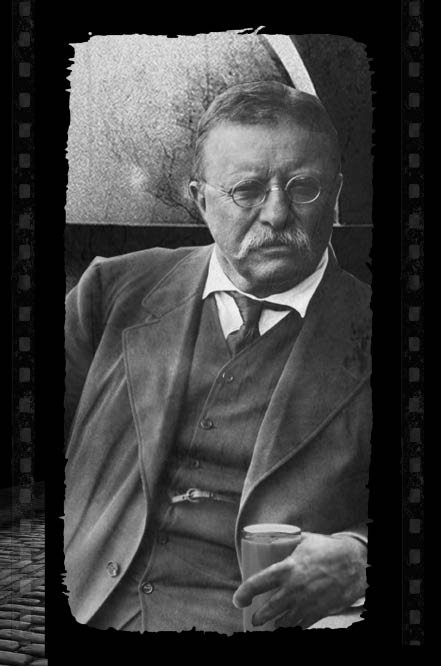
___
Teddy had me picked up in his Packard Electrics car, him driving with Nikola at his side. I got into the back. He sped up English Street and squealed the wheels, almost flipping us, onto Webb Street. We went past Collins Cove to avoid the Hood milk wagons at this hour on the interior sections of Bridge Street, but we got onto Bridge Street later from Planters. Lucky for us, the drawbridge was down and we took the next right after the bridge to go past Dane Street Beach after a left up the hill. Then it was just another two rights, in quick succession, and we were on Ober. This time the trolley was not blocked, but pedestrians walked all over the road. Teddy had no patience and just sped through them casting many to the side. Some of Taft’s bodyguards tried to stop him, but they were forced to jump aside and make way for him.
We parked by the carriage house. As I exited the car, I noticed Mrs. Evans walking across the way for her driver. I paid my respects. “Thank you Henry, you are so kind. Look at this crowd!” said a woman who was at her wits end. Woodbury Point where she resided was strewn with strangers, mostly drunk, who were picnicking, cavorting, hooting and hollowing. Many came to catch a glimpse of the president, but most just came for the party atmosphere that descended on the property. Many took to ripping parts of her estate down and bringing them home as souvenirs. “I must swear, the saint my husband was, this is the worst decision he ever made while he was alive was agreeing to let Taft reside here and he is not even going to be around to bear the brunt of any of it,” she exclaimed, as one frantic and in a hurry.
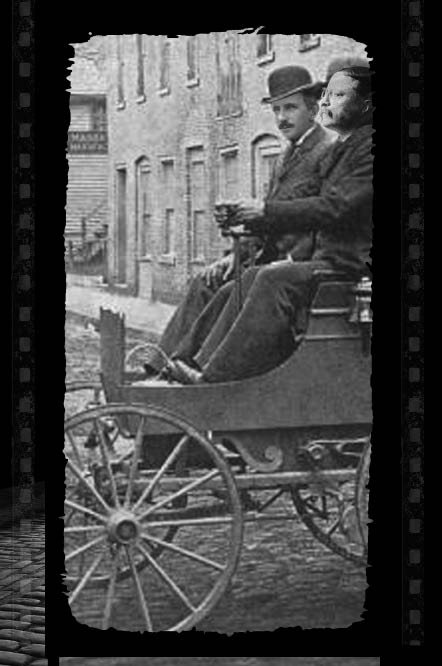
As Teddy and I had watched Mrs. Evans enter her car and drive off, we went toward Taft’s residence as we left Nikola behind to examine Lucius Packard’s car. I had noticed him making subtle grunts and nods as he looked at various parts and heard the sounds of the car as Teddy drove us here.
Taft’s butler showed us into the parlor where Taft was in conference with Frick. I kept my composure. I never warmed up to Henry. Frick came in like a barnstormer and took over the Farms. I never cared for him, but ever since he hired the Pinkertons to kill labor protestors at the Homestead Massacre, I despised him. I remember Carnegie just washed his hands of the affairs. He let Frick handle his workers as he saw fit and just went to Scotland to play golf. Then his negligence at the South Fork Damn and the Johnstown Flood… Don’t get me going…
“Hello Teddy. Sinclair. Who is your friend here?” Taft asked looking at Nikola.
“Taft, this is my old friend from Serbia, Nikola Tesla the eminent inventor,” I answered.
“Pleasure sir. Now join me in the drawing room where I have some light refreshments laid out for us.”
We followed him and Frick into the room. I was the last to enter. I would never have wanted Frick behind me at anytime. Nikola, as he walked in went toward the library and started observing titles on the shelf. He was an old advocate that the only true way to get to know someone is by the books in their study versus those they have for show in the library. These are the books they draw on the most.
The conversation relied mostly on Taft and Teddy going over tales from the White House and the personalities within and from all over the world. The mood changed as Taft recalled Teddy being thrown by a Ninjutsu expert. Teddy became Gruff and he turned the subject to Cuba.
“Why won’t you pull the troops!” Teddy blurted, “They are needed in Panama!”
“Now Teddy, lets not boor our compatriots today. Plus this will not end friendly.”
Taft’s butler handed Teddy a scotch and he settled on a stiff snort of it. Probably mostly in disgust that it was not chocolate milk. Henry never took his cold stare off me. Henry Clay Frick reminded me of Stephen White who I dealt with years ago within the Joseph White murder case in Salem. White had at one time controlled John Quincy Adams as he ran for his second term, His brother-in-law Joseph Story in the Supreme Court, Daniel Webster whose son was married to his daughter, and the prestigious Henry Clay. To cap it all off he controlled the national bank at the time. Frick’s stare was as steely as the steel Carnegie and he had made. Very similar to White’s stare. Frick began talking; I just zoned out in disgust.
Teddy slapped me on the back of the head to break my stare and I heard Taft, “You all must join me on the course tomorrow at the Essex Country Club.” Teddy agreed for all us as Nikola slammed the last book he was looking at and placed it on Taft’s desk on purpose without returning it to where he found it and filled out behind me and the president.
We got back in Teddy’s car and we went our way slowly up Ober Street. We did not make it far through the fray before a woman collapsed into our tire. Teddy was the first to get out, followed by Tesla who was closest to her to help. She seemed to be in a daze. Her clothes were a strew, just thrown on hanging from her shoulders with some vital areas exposed. I have not seen anyone so much in a state since the ghost on Derby Street that possessed a woman deep in her cups to save her sister that was dying of an opium overdose in the alley next to the Derby House. That was another life time ago, for most people...
“Stay away from here! Bad things have happened! They are still happening. The Shoggoths are coming out of their frozen expanse. My body has been penetrated by things that bend the mind. Formless things. Arcane rituals. You must leave this place.” She just broke free and ran off into the crowd and we lost her.
___
I had Louie drive me to golf. I met Tesla, Teddy, and Taft at the second hole. With them was Frederick Ayers and the Hammonds. Ayers made a small fortune in patent medicine, but raked it all in on textiles in Lawrence. We were one short for me to join in for pairs, so I just joined for the walk. I always thought there was a better game to be played with a stick, two balls and a hole...Ayers played with Taft. Tesla showed as much agitation as I showed with Frick the other day.
Clemens had introduced Nikola to the Hammonds a few years ago. There was talk about starting the Tesla-Hammond Wireless Electric Company, but nothing came of it besides a few seances and some experiments in psychic powers. In fact John Hays Hammond Jr., the son of the pair, would steal some expired patents in radio technology in the future. It was bad enough Marconi just won the Nobel Peace Prize for stealing some radio technologies from Nikola this very year.
“You Can Not Reanimate the Flesh!” Nikola was in a furry.
“You heard for yourself at our estate incorporeal souls speaking to you. The intelligence can be moved from one vessel to another; for that is merely what the flesh is.” John Jr. was arguing with our friend.
“Yes, but the flesh will not rise again.”
“The ancient Chinese through acupuncture have proven a thousand years ago that electricity governs the movements and the health of the body. There is no reason after a silent death of the heart as it stills without a traumatic accident crippling the muscle and nerves that another bolt would not animate the body once more right after. Then add a consciousness once more to guide it.” Hammond said in utter confidence as if he were giving a lecture to a silent class. “In fact many of our elderly on the Gold Coast here would pay dearly for a younger vessel to have their soul transferred to.”
“That is sacrilege. I have been caught at many of your orgies of the flesh, which I quite enjoyed with the elite of Broadway on tour, but the calling on the Younger Ones and your sacrifices on the ocean, I can never partake on again for on those nights, I clasped my breast tight to prevent my own soul from being stolen.”
“You know West, was right. You felt it. You have seen it. Herbert reanimated the flesh several times, granted only the boxer lived.”
“Yes he is in Arkham Asylum now after he got caught during his cannibalistic killing spree. His brain was bashed in before death and the Doctor’s brain was dead too long before reanimation.”
“Though you just said it, the physical machines were broken. Those brains, the vessels that the soul resides in were damaged. If we can keep the machines in top shape before and after reanimation it will work. Then we apply the right current of electricity...”
At this moment a man on a horse gallops in and interjects, “Herbert West. Fine doctor. I served with him at West Point. Not much of a cavalryman, I must say,” the man is cut short as his horse rises up and throws him. John Hays Hammond Sr. spooked him by brandishing a golf club from his bag.
“You have to forgive my future son-in-law; he is a bit of a klutz, but he has a fine head. Graduated top of his class at West Point and is a potential team member of the 1912 Olympics,” Ayers explains, “But still, a klutz. Gentleman this is George Patton.”
George Stands brushing off his pants and shakes my hand. “Glad to meat you sir.”
“Henry.” I say and the rest of the introductions go around. This brought an end to the debate and George joined me in pairs for the rest of the holes. We shared Teddy’s bag.
On the way out after a light lunch Tesla asked, “What do you know of the experience of Edward Derby and his wife, Asenath? Along with some texts on the Illuminati by Morse’s father and Rev Bentley locally? I had seen a volume by Adam Weishaupt, a manuscript that is in his own hand with William Russell’s inscription just within the cover on Taft’s shelves in his library. There was also a treaties on the strange happenings of Derby and his wife compiled by the Miskatonic University. Derby was also in Arkham Asylum?”
___
A few days later I get a telegraph on my old Page Machine. Only a few friends I know still use Charles’ machine still, even though it is a far more effective tool. Tesla is one who finds it better to transfer his various radio technologies through that machine. Much more adaptive for his needs than Morse’s. Plus JP Morgan listens in on all of the telegraph messages. Morgan and Tesla had a falling out 3 years ago after Tesla had to give up his tower in Long Island because Morgan crashed the market that Tesla invested in with the funds Morgan gave him to build the tower…
Dear Henry ~ Stop.
Meet me at Mme. Zaza, occultist and palmist in nearby shop to Mason
Lodge ~Stop.
Wednesday, 4pm ~ Stop.
Nikola ~ Stop.
So Thursday came and I met Nikola and Mme. Zaza. Instantaneously I recognized Lady Jude who worked with King Mumford all those years ago. She knew me. She was not immortal, but upon her birth all of her lives would come flooding in once she becomes conscious after the first few months of life. “Henry, good to see you. It has been almost thirty years. Why have you not found me sooner. Only a bridge blocked us.”
“I can ask you the same.”
“I see you have been introduced already. Thirty years? You do not look older than 20 my dear.” Tesla exclaimed looking Zaza up and down.
“No. From another time. Henry and I met originally in the Occident as I was an Egyptian on a caravan plying my goods. I helped him remove his mother and a troublesome pregnant wife from Canaan to Egypt to avoid prosecution some 2,000 years ago. Then I had seen them safely to Marseilles, France. I taught his daughter well, in time. So much so she became a queen of the Gypsies.”
Zaza was quite talented. She had followed Fredrick Douglass up from the south and hid in Salem. She was a fugitive slave who kept changing her name and making up new histories for herself. The Remonds had helped her with a few alias before she settled in New Orleans. There she became know as Marie Catherine Laveau, the Voodoo Queen.
“There is plenty of time for that later, but there is some strange goings-on at Woodbury Point. I have seen many High members of the Hiram Lodge get off the train here and take private cars there. All alumni of the Skull & Bones and descendants of the Hartford Convention. Many from the Bohemian Grove.”
“Ah, Bohemian Grove. Clemens has mentioned that place. He went for a few years when it was for writers and artists. He said it turned dark quick. He mentioned hearing tales of Frick and Carnegie planning the Homestead Massacre there and mocking the Johnstown Flood during the Ceremony of Cremation after he stopped going from friends. I believe some of the actors who partake in the Hammonds’ debauchery are also members of the Grove. I have been caught up in many a strange events when the green fairy grabbed me and I did not have my with all to leave during their dark ceremonies. I wish I had my wits about me enough to have left and saved my soul from those marks they have placed upon it.”
“I met some of those men before in Knob Hill. Some befriended Mark Hopkins.” I said with a head shrug. In this life by the population at large, I am Edward S. Searles who married Hopkins’ widow. Some say I married the woman who was 20 years my elder for her money. From her husband she received the 33rd largest fortune in American history. When she died 18 years ago, that fortune was mine.
In this life as Edward I surpassed my old friend Elias Hasket Derby Sr. who is ranked 39th, but Frick, that bastard, is the 27th just a few million short of JP Morgan. I met the Hopkins when I was decorating their Knob Hill mansion in San Francisco. After Mark’s death, me and Mary used that fortune to travel Europe with the help of François-Bérenger Saunière. We retrieved many of the most potent and dangerous religious and magical items that made their way into private collections who’s owners would have used them for destructive means. Many chapels that had others, we found safe, we let them retain those items. Now the items we did capture are safe in my Chapel under Salem. That is also a story for another date. As well are the tales Lady Jude and myself have had through the many lives we have danced together.
So gold digger? If you know my true wealth, I would be a thousand times richer than John D. Rockefeller. Not only do I have some of the most priceless items from the last 4,000 years or so, but I have been quite frugal for the last 500 years or so with compounded interest and all…
I was the one who gave Hopkins the loan to build his Central Pacific Railroad that completed the First Transcontinental Railroad. The Gold Spike was some gold from Solomon’s Temple, blessed by the man himself.
My fiends who have been reincarnated countless times and times again, know me as Henry. You probably recognize your friends too.
Have you ever had a dream of a friend where his voice is the same, but he looks completely different, even though he carries himself with the same bearing, gate, and body language. In dreams we see the soul as we first met them all of those lives ago. In fact! I just recognized George Patton as someone I knew at the Siege Of Orleans. He was in the army of Henry V when they laid waste to Agincourt, but when he returned I was Henry d’ Anjou fighting alongside Joan d’ Arc. We won that time and we had a drink afterward where he was enamored with our French Boadicea.
Henry just seems to stick through the years…
Most of the Hopkins fortune I gave to the poor in Methuen and the factory workers of Lawrence, many who worked for Ayers.
“Henry, many women have disappeared from the Bennet Street Neighborhood. The police just believe they are in the throng of the people descending upon Mrs. Evans property. No one is looking for them besides their families,” Jude tells, “Many of the dark magicians from Salem and the spiritualists who have worked with the Hammonds on the Gold Coast have been flocking there too. I have been asked, for my powers are legendary, but I can not play with any of those dark powers. My karma, I have been rebuilding since my time in New Orleans where I strayed, quite a lot from the good path.”
“That fits with the woman who bumped into Teddy’s car. She said some horrible things are happening. Something about Shoggoths...” Nikola said confused and excited.
“Shoggoths. Shackleton revived them on his expedition to Antarctica. For some time on their journey they were possessed by these formless monsters who can take you over cell by cell. As they were starving to death and carried fine silverware and crystal goblets and fine linens to spread over their diner table; none of them brought survival supplies or food for days out from their ship. Story has it that the ship got stuck in the ice beforehand, but it actually got stuck after Ernest realized that half of his crew were this monster. They could not attempt to seize him till they regained some sense and returned to where the food was to recoup. When their bodies and minds were refreshed these monsters turned on him in the skins of his closest friends. He was the one who stranded the ship and did not radio, one of your early ones I believe Nikola, for help till he killed all of these fiends with those who remained human. One or two of his crew were the monsters in disguise who made it back to civilization. I fear by what Lady Jude is saying, they made it to our shores,’ I explained.
___
I have been asked to meet the widow Evans, as we finally begin to call her, at the main house. Louie drives me in with a pocket of nails and a necklace of garlic around his neck… The nails I believe is some magic Zaza had mentioned to him that will keep his soul nailed to his skin so another can not jump in it. Strange for Louie, he is quiet the whole trip and is actually driving slow in our Stanley. Too slow.
We make it past the regular throng of people trespassing on the widow’s wits. We make it to the back door from the carriage house. We are invited in for some fine tea that is poured from a unique tea pot. It was exquisite blue and white hand painted porcelain with a stout cylinder-like shape, rather than a more rounded one that came over with an obscure ancestor named Kùnrǎozhe Yǒnghéng from China. I think she mentioned it was during the time that the Salem was being attacked by Chinese Vampires who hid their horrid feeding habit amongst the hypodermic deaths from the opium users in Salem.
She pours out a fine Lapsang souchong and remembers I like plenty of milk in mine so she pours only a half cup for me. Louie drove away in a hurry and did not join us.
It is when Teddy burst in that I notice that there was a third teacup in which she already poured a full cup into. “I just got done with Taft and he is talking more and more of breaking my Square Deal. Frick has persuaded him too with the Tennessee Iron and Coal deal. The Republican Party is falling into Whigs’ and Tories’ hands more and more every day as England persuades those alumni from Yale to do so,” Teddy said as he sat heavy and almost knocked over his tea, “I apologize for the spill.”
“That is OK old friend. I will clean it up.”
“So what is going on at your estate at night. I have heard rumors,” Teddy asked with true concern hoping it was not as bad as he has surmised.,
“Strange goings on. Evil things. I hear all sorts of howls that can not come from beast or humans of this world that crescendo at 3am. Many people and strange shadows do I see run past my windows. I have called in many of the larger men who worked in my late husband’s factory which he trusted with his life to protect me in the night. They stand guard at all the doors and most of the windows. During the night I am a prisoner on my own property within this house. Many Federal guards and those damn Pinkertons are about. Many have sexually accosted me on several occasions and said things by dear Robert would even blush at. He must be in a terrible fit looking down at me being powerless to help,” the widow said before continuing in a very disgusted tone, “I have even went down to the beach to see Taft in the nude under the moon, all 400 pounds of him. He had more rolls than the waves rolling in the sea. That image is burned into my mind forever and will haunt me beyond this life. You would not believe what young dames he had satisfying his whims at the same time. Truly horrid!!! He acts this way with his wife who still is catatonic.”
“Would you have a sample of his handwriting; maybe from his lease?” with that Teddy produced two pieces of paper, “Here this one is the letter Taft sent accepting the position I offered him as I became president in truth. This other one is a page ripped from Weishaupt’s manuscript, that Nikola mentioned seeing, signed by William Russell.”
Mrs. Evans returned with the lease and Teddy investigated the style of the hand. It was more like Russell’s than the writing on the letter Teddy kept always in his wallet. “Strange, it is Russell’s hand. How can this be?”
“Teddy, Ephraim Waite was said to posses his daughter Asenath who was stealing Edward Derby, her husband’s, mind and body. He was forced to occupy the dead corpse of her long enough to convince his friend to kill her in his own body. Maybe Ephraim jumped bodies before the body of Edward was finished; per say in even a cat?”
“I have heard of this Waite, but he was known as Arthur Edward Waite. He had the Ryder-Waite Tarot Deck made, but in secret attributed to his coven name Kamong. He had another deck made with the qlipothic tree that could work many horrid spells, open portals between places, and even undo creation,” I explained to him.
It was many years ago I hid some of the qlipothic stones under the Earth with the Dark Fairies on a remarkable All Hallows Eve.
“Now Taft’s father, Alphonso, started the Skull & Bones with Russell. Could Russell have taken over this Waite and in time made his way to his partner’s son as he was taking over the presidency? The Waites hailing out of Gloucester have spread all over the Gold Coast and hold much influence still. Some say a very dark fishy influence...” Teddy continued.
“I know in 1830 Russell went to meet Weishaupt upon his last days and brought back many secrets of the Illuminati he created. Did Russell have Weishaupt take over his mind and body? Maybe Russell fought like Edward Derby for three years before he had to let go. In 1833 Russell and Alphonso Taft make the Skull & Bones.” I wonder out loud.
Continued on the Last Story...
Now we have had a little taste of death with a dash of the occult. Skull & Bones and fast cars. Could Evans' fall from his horse have been murder? I have always said cars were safer than horses...as my friend below can attest to.
What about the possession of Edward Derby? How does that connect to one real obese president?
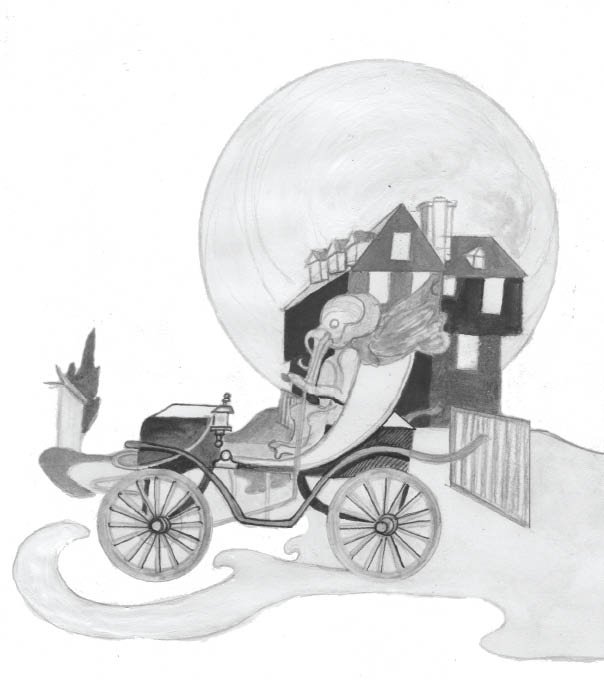
e-Issue $5.00
e-Subscription for a Year $10.00
Print issue: $12.25 + Shipping
Print Yearly Subscription: $66.00 + Shipping
Subscribe to read more!
e-Issue $5.00
e-Subscription for a Year $10.00
Print issue: $12.25 + Shipping
Print Yearly Subscription: $66.00 + Shipping
THE EYES HAVE IT
RANDALL GARRETT
Illustrated by John Schoenherr
In a sense, this is a story of here-and-now. This Earth, this year ... but on a history-line slipped slightly sidewise. A history in which a great man acted differently, and Magic, rather than physical science, was developed....
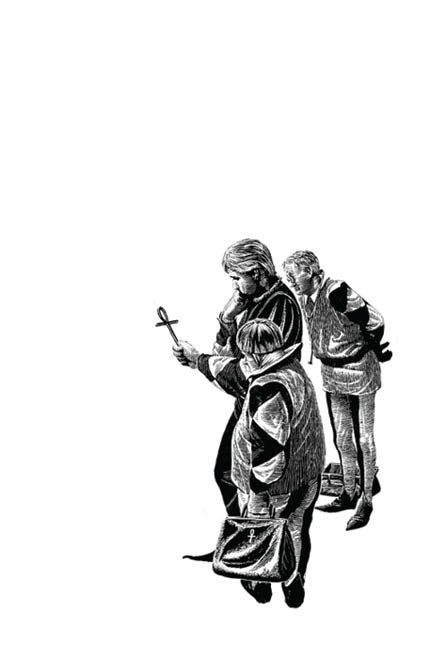
Sir Pierre Morlaix, Chevalier of the Angevin Empire, Knight of the Golden Leopard, and secretary-in-private to my lord, the Count D’Evreux, pushed back the lace at his cuff for a glance at his wrist watch--three minutes of seven. The Angelus had rung at six, as always, and my lord D’Evreux had been awakened by it, as always. At least, Sir Pierre could not remember any time in the past seventeen years when my lord had not awakened at the Angelus. Once, he recalled, the sacristan had failed to ring the bell, and the Count had been furious for a week. Only the intercession of Father Bright, backed by the Bishop himself, had saved the sacristan from doing a turn in the dungeons of Castle D’Evreux.
Sir Pierre stepped out into the corridor, walked along the carpeted flagstones, and cast a practiced eye around him as he walked. These old castles were difficult to keep clean, and my lord the Count was fussy about nitre collecting in the seams between the stones of the walls. All appeared quite in order, which was a good thing. My lord the Count had been making a night of it last evening, and that always made him the more peevish in the morning. Though he always woke at the Angelus, he did not always wake up sober.
Sir Pierre stopped before a heavy, polished, carved oak door, selected a key from one of the many at his belt, and turned it in the lock. Then he went into the elevator and the door locked automatically behind him. He pressed the switch and waited in patient silence as he was lifted up four floors to the Count’s personal suite.
By now, my lord the Count would have bathed, shaved, and dressed. He would also have poured down an eye-opener consisting of half a water glass of fine Champagne brandy. He would not eat breakfast until eight. The Count had no valet in the strict sense of the term. Sir Reginald Beauvay held that title, but he was never called upon to exercise the more personal functions of his office. The Count did not like to be seen until he was thoroughly presentable.
The elevator stopped. Sir Pierre stepped out into the corridor and walked along it toward the door at the far end. At exactly seven o’clock, he rapped briskly on the great door which bore the gilt-and-polychrome arms of the House D’Evreux.
For the first time in seventeen years, there was no answer.
Sir Pierre waited for the growled command to enter for a full minute, unable to believe his ears. Then, almost timidly, he rapped again.
There was still no answer.
Then, bracing himself for the verbal onslaught that would follow if he had erred, Sir Pierre turned the handle and opened the door just as if he had heard the Count’s voice telling him to come in.
“Good morning, my lord,” he said, as he always had for seventeen years.
But the room was empty, and there was no answer.
He looked around the huge room. The morning sunlight streamed in through the high mullioned windows and spread a diamond-checkered pattern across the tapestry on the far wall, lighting up the brilliant hunting scene in a blaze of color.
“My lord?”
Nothing. Not a sound.
The bedroom door was open. Sir Pierre walked across to it and looked in.
He saw immediately why my lord the Count had not answered, and that, indeed, he would never answer again.
My lord the Count lay flat on his back, his arms spread wide, his eyes staring at the ceiling. He was still clad in his gold and scarlet evening clothes. But the great stain on the front of his coat was not the same shade of scarlet as the rest of the cloth, and the stain had a bullet hole in its center.
Sir Pierre looked at him without moving for a long moment. Then he stepped over, knelt, and touched one of the Count’s hands with the back of his own. It was quite cool. He had been dead for hours.
“I knew someone would do you in sooner or later, my lord,” said Sir Pierre, almost regretfully.
Then he rose from his kneeling position and walked out without another look at his dead lord. He locked the door of the suite, pocketed the key, and went back downstairs in the elevator.
___
Mary, Lady Duncan stared out of the window at the morning sunlight and wondered what to do. The Angelus bell had awakened her from a fitful sleep in her chair, and she knew that, as a guest at Castle D’Evreux, she would be expected to appear at Mass again this morning. But how could she? How could she face the Sacramental Lord on the altar--to say nothing of taking the Blessed Sacrament itself. Still, it would look all the more conspicuous if she did not show up this morning after having made it a point to attend every morning with Lady Alice during the first four days of this visit.
She turned and glanced at the locked and barred door of the bedroom. He would not be expected to come. Laird Duncan used his wheelchair as an excuse, but since he had taken up black magic as a hobby he had, she suspected, been actually afraid to go anywhere near a church.
If only she hadn’t lied to him! But how could she have told the truth? That would have been worse--infinitely worse. And now, because of that lie, he was locked in his bedroom doing only God and the Devil knew what.
If only he would come out. If he would only stop whatever it was he had been doing for all these long hours--or at least finish it! Then they could leave Evreux, make some excuse--any excuse--to get away. One of them could feign sickness. Anything, anything to get them out of France, across the Channel, and back to Scotland, where they would be safe!
She looked back out of the window, across the courtyard, at the towering stone walls of the Great Keep and at the high window that opened into the suite of Edouard, Count D’Evreux.
Last night she had hated him, but no longer. Now there was only room in her heart for fear.
She buried her face in her hands and cursed herself for a fool. There were no tears left for weeping--not after the long night.
Behind her, she heard the sudden noise of the door being unlocked, and she turned.
Laird Duncan of Duncan opened the door and wheeled himself out. He was followed by a malodorous gust of vapor from the room he had just left. Lady Duncan stared at him.
He looked older than he had last night, more haggard and worn, and there was something in his eyes she did not like. For a moment he said nothing. Then he wet his lips with the tip of his tongue. When he spoke, his voice sounded dazed.
“There is nothing to fear any more,” he said. “Nothing to fear at all.”
___
The Reverend Father James Valois Bright, Vicar of the Chapel of Saint-Esprit, had as his flock the several hundred inhabitants of the Castle D’Evreux. As such, he was the ranking priest--socially, not hierarchically--in the country. Not counting the Bishop and the Chaplain at the Cathedral, of course. But such knowledge did little good for the Father’s peace of mind. The turnout of the flock was abominably small for its size--especially for week-day Masses. The Sunday Masses were well attended, of course; Count D’Evreux was there punctually at nine every Sunday, and he had a habit of counting the house. But he never showed up on weekdays, and his laxity had allowed a certain further laxity to filter down through the ranks.
The great consolation was Lady Alice D’Evreux. She was a plain, simple girl, nearly twenty years younger than her brother, the Count, and quite his opposite in every way. She was quiet where he was thundering, self-effacing where he was flamboyant, temperate where he was drunken, and chaste where he was--
Father Bright brought his thoughts to a full halt for a moment. He had, he reminded himself, no right to make judgments of that sort. He was not, after all, the Count’s confessor; the Bishop was. Besides, he should have his mind on his prayers just now.
He paused and was rather surprised to notice that he had already put on his alb, amice, and girdle, and he was aware that his lips had formed the words of the prayer as he had donned each of them.
Habit, he thought, can be destructive to the contemplative faculty.
He glanced around the sacristy. His server, the young son of the Count of Saint Brieuc, sent here to complete his education as a gentleman who would some day be the King’s Governor of one of the most important counties in Brittany, was pulling his surplice down over his head. The clock said 7:11.
Father Bright forced his mind Heavenward and repeated silently the vesting prayers that his lips had formed meaninglessly, this time putting his full intentions behind them. Then he added a short mental prayer asking God to forgive him for allowing his thoughts to stray in such a manner.
He opened his eyes and reached for his chasuble just as the sacristy door opened and Sir Pierre, the Count’s Privy Secretary, stepped in.
“I must speak to you, Father,” he said in a low voice. And, glancing at the young De Saint-Brieuc, he added: “Alone.”
Normally, Father Bright would have reprimanded anyone who presumed to break into the sacristy as he was vesting for Mass, but he knew that Sir Pierre would never interrupt without good reason. He nodded and went outside in the corridor that led to the altar.
“What is it, Pierre?” he asked.
“My lord the Count is dead. Murdered.”
After the first momentary shock, Father Bright realized that the news was not, after all, totally unexpected. Somewhere in the back of his mind, it seemed he had always known that the Count would die by violence long before debauchery ruined his health.
“Tell me about it,” he said quietly.
Sir Pierre reported exactly what he had done and what he had seen.
“Then I locked the door and came straight here,” he told the priest.
“Who else has the key to the Count’s suite?” Father Bright asked.
“No one but my lord himself,” Sir Pierre answered, “at least as far as I know.”
“Where is his key?”
“Still in the ring at his belt. I noticed that particularly.”
“Very good. We’ll leave it locked. You’re certain the body was cold?”
“Cold and waxy, Father.”
“Then he’s been dead many hours.”
“Lady Alice will have to be told,” Sir Pierre said.
Father Bright nodded. “Yes. The Countess D’Evreux must be informed of her succession to the County Seat.” He could tell by the sudden momentary blank look that came over Sir Pierre’s face that the Privy Secretary had not yet realized fully the implications of the Count’s death. “I’ll tell her, Pierre. She should be in her pew by now. Just step into the church and tell her quietly that I want to speak to her. Don’t tell her anything else.”
“I understand, Father,” said Sir Pierre.
___
There were only twenty-five or thirty people in the pews--most of them women--but Alice, Countess D’Evreux was not one of them. Sir Pierre walked quietly and unobtrusively down the side aisle and out into the narthex. She was standing there, just inside the main door, adjusting the black lace mantilla about her head, as though she had just come in from outside. Suddenly, Sir Pierre was very glad he would not have to be the one to break the news.
She looked rather sad, as always, her plain face unsmiling. The jutting nose and square chin which had given her brother the Count a look of aggressive handsomeness only made her look very solemn and rather sexless, although she had a magnificent figure.
“My lady,” Sir Pierre said, stepping towards her, “the Reverent Father would like to speak to you before Mass. He’s waiting at the sacristy door.”
She held her rosary clutched tightly to her breast and gasped. Then she said, “Oh. Sir Pierre. I’m sorry; you quite surprised me. I didn’t see you.”
“My apologies, my lady.”
“It’s all right. My thoughts were elsewhere. Will you take me to the good Father?”
Father Bright heard their footsteps coming down the corridor before he saw them. He was a little fidgety because Mass was already a minute overdue. It should have started promptly at 7:15.
The new Countess D’Evreux took the news calmly, as he had known she would. After a pause, she crossed herself and said, “May his soul rest in peace. I will leave everything in your hands, Father, Sir Pierre. What are we to do?”
“Pierre must get on the teleson to Rouen immediately and report the matter to His Highness. I will announce your brother’s death and ask for prayers for his soul--but I think I need say nothing about the manner of his death. There is no need to arouse any more speculation and fuss than necessary.”
“Very well,” said the Countess. “Come, Sir Pierre; I will speak to the Duke, my cousin, myself.”
“Yes, my lady.”
Father Bright returned to the sacristy, opened the missal, and changed the placement of the ribbons. Today was an ordinary Feria; a Votive Mass would not be forbidden by the rubics. The clock said 7:17.
He turned to young De Saint-Brieuc, who was waiting respectfully. “Quickly, my son--go and get the unbleached beeswax candles and put them on the altar. Be sure you light them before you put out the white ones. Hurry, now; I will be ready by the time you come back. Oh yes--and change the altar frontal. Put on the black.”
“Yes, Father.” And the lad was gone.
Father Bright folded the green chasuble and returned it to the drawer, then took out the black one. He would say a Requiem for the Souls of All the Faithful Departed--and hope that the Count was among them.
___
His Royal Highness, the Duke of Normandy, looked over the official letter his secretary had just typed for him. It was addressed to Serenissimus Dominus Nostrus Iohannes Quartus, Dei Gratia, Angliae, Franciae, Scotiae, Hiberniae, et Novae Angliae, Rex, Imperator, Fidei Defensor, ... “Our Most Serene Lord, John IV, by the Grace of God King and Emperor of England, France, Scotland, Ireland, and New England, Defender of the Faith, ...”
It was a routine matter; simple notification to his brother, the King, that His Majesty’s most faithful servant, Edouard, Count of Evreux had departed this life, and asking His Majesty’s confirmation of the Count’s heir-at-law, Alice, Countess of Evreux as his lawful successor.
His Highness finished reading, nodded, and scrawled his signature at the bottom: Richard Dux Normaniae.
Then, on a separate piece of paper, he wrote: “Dear John, May I suggest you hold up on this for a while? Edouard was a lecher and a slob, and I have no doubt he got everything he deserved, but we have no notion who killed him. For any evidence I have to the contrary, it might have been Alice who pulled the trigger. I will send you full particulars as soon as I have them. With much love, Your brother and servant, Richard.”
He put both papers into a prepared envelope and sealed it. He wished he could have called the king on the teleson, but no one had yet figured out how to get the wires across the channel.
He looked absently at the sealed envelope, his handsome blond features thoughtful. The House of Plantagenet had endured for eight centuries, and the blood of Henry of Anjou ran thin in its veins, but the Norman strain was as strong as ever, having been replenished over the centuries by fresh infusions from Norwegian and Danish princesses. Richard’s mother, Queen Helga, wife to His late Majesty, Henry X, spoke very few words of Anglo-French, and those with a heavy Norse accent.
Nevertheless, there was nothing Scandinavian in the language, manner, or bearing of Richard, Duke of Normandy. Not only was he a member of the oldest and most powerful ruling family of Europe, but he bore a Christian name that was distinguished even in that family. Seven Kings of the Empire had borne the name, and most of them had been good Kings--if not always “good” men in the nicey-nicey sense of the word. Even old Richard I, who’d been pretty wild during the first forty-odd years of his life, had settled down to do a magnificent job of kinging for the next twenty years. The long and painful recovery from the wound he’d received at the Siege of Chaluz had made a change in him for the better.
There was a chance that Duke Richard might be called upon to uphold the honor of that name as King. By law, Parliament must elect a Plantagenet as King in the event of the death of the present Sovereign, and while the election of one of the King’s two sons, the Prince of Wales and the Duke of Lancaster, was more likely than the election of Richard, he was certainly not eliminated from the succession.
Meantime, he would uphold the honor of his name as Duke of Normandy.
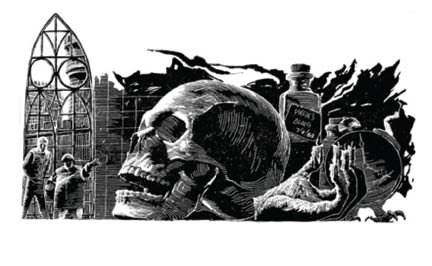
Murder had been done; therefore justice must be done. The Count D’Evreux had been known for his stern but fair justice, almost as well as he had been known for his profligacy. And, just as his pleasures had been without temperance, so his justice had been untempered by mercy. Whoever had killed him would find both justice and mercy--in so far as Richard had it within his power to give it.
Although he did not formulate it in so many words, even mentally, Richard was of the opinion that some debauched woman or cuckolded man had fired the fatal shot. Thus he found himself inclining toward mercy before he knew anything substantial about the case at all.
Richard dropped the letter he was holding into the special mail pouch that would be placed aboard the evening trans-channel packet, and then turned in his chair to look at the lean, middle-aged man working at a desk across the room.
“My lord Marquis,” he said thoughtfully.
“Yes, Your Highness?” said the Marquis of Rouen, looking up.
“How true are the stories one has heard about the late Count?”
“True, Your Highness?” the Marquis said thoughtfully. “I would hesitate to make any estimate of percentages. Once a man gets a reputation like that, the number of his reputed sins quickly surpasses the number of actual ones. Doubtless many of the stories one hears are of whole cloth; others may have only a slight basis in fact. On the other hand, it is highly likely that there are many of which we have never heard. It is absolutely certain, however, that he has acknowledged seven illegitimate sons, and I dare say he has ignored a few daughters--and these, mind you, with unmarried women. His adulteries would be rather more difficult to establish, but I think your Highness can take it for granted that such escapades were far from uncommon.”
He cleared his throat and then added, “If Your Highness is looking for motive, I fear there is a superabundance of persons with motive.”
“I see,” the Duke said. “Well, we will wait and see what sort of information Lord Darcy comes up with.” He looked up at the clock. “They should be there by now.”
Then, as if brushing further thoughts on the subject from his mind, he went back to work, picking up a new sheaf of state papers from his desk.
The Marquis watched him for a moment and smiled a little to himself. The young Duke took his work seriously, but was well-balanced about it. A little inclined to be romantic--but aren’t we all at nineteen? There was no doubt of his ability, nor of his nobility. The Royal Blood of England always came through.
___
“My lady,” said Sir Pierre gently, “the Duke’s Investigators have arrived.”
My Lady Alice, Countess D’Evreux, was seated in a gold-brocade upholstered chair in the small receiving room off the Great Hall. Standing near her, looking very grave, was Father Bright. Against the blaze of color on the walls of the room, the two of them stood out like ink blots. Father Bright wore his normal clerical black, unrelieved except for the pure white lace at collar and cuffs. The Countess wore unadorned black velvet, a dress which she had had to have altered hurriedly by her dressmaker; she had always hated black and owned only the mourning she had worn when her mother died eight years before. The somber looks on their faces seemed to make the black blacker.
“Show them in, Sir Pierre,” the Countess said calmly.
Sir Pierre opened the door wider and three men entered. One was dressed as one gently born, the other two wore the livery of the Duke of Normandy.
The gentleman bowed. “I am Lord Darcy, Chief Criminal Investigator for His Highness, the Duke, and your servant, my lady.” He was a tall, brown-haired man in his thirties with a rather handsome, lean face. He spoke Anglo-French with a definite English accent.
“My pleasure, Lord Darcy,” said the Countess. “This is our vicar, Father Bright.”
“Your servant, Reverend Sir.” Then he presented the two men with him. The first was a scholarly-looking, graying man wearing pince-nez glasses with gold rims, Dr. Pateley, Physician. The second, a tubby, red-faced, smiling man, was Master Sean O Lochlainn, Sorcerer.
As soon as Master Sean was presented he removed a small, leather-bound folder from his belt pouch and proffered it to the priest. “My license, Reverend Father.”
Father Bright took it and glanced over it. It was the usual thing, signed and sealed by the Archbishop of Rouen. The law was rather strict on that point; no sorcerer could practice without the permission of the Church, and a license was given only after careful examination for orthodoxy of practice.
“It seems to be quite in order, Master Sean,” said the priest, handing the folder back. The tubby little sorcerer bowed his thanks and returned the folder to his belt pouch.
Lord Darcy had a notebook in his hand. “Now, unpleasant as it may be, we shall have to check on a few facts.” He consulted his notes, then looked up at Sir Pierre. “You, I believe, discovered the body?”
“That is correct, your lordship.”
“How long ago was this?”
Sir Pierre glanced at his wrist watch. It was 9:55. “Not quite three hours ago, your lordship.”
“At what time, precisely?”
“I rapped on the door precisely at seven, and went in a minute or two later--say 7:01 or 7:02.”
“How do you know the time so exactly?”
“My lord the Count,” said Sir Pierre with some stiffness, “insisted upon exact punctuality. I have formed the habit of referring to my watch regularly.”
“I see. Very good. Now, what did you do then?”
Sir Pierre described his actions briefly.
“The door to his suite was not locked, then?” Lord Darcy asked.
“No, sir.”
“You did not expect it to be locked?”
“No, sir. It has not been for seventeen years.”
Lord Darcy raised one eyebrow in a polite query. “Never?”
“Not at seven o’clock, your lordship. My lord the Count always rose promptly at six and unlocked the door before seven.”
“He did lock it at night, then?”
“Yes, sir.”
Lord Darcy looked thoughtful and made a note, but he said nothing more on that subject. “When you left, you locked the door?”
“That is correct, your lordship.”
“And it has remained locked ever since?”
Sir Pierce hesitated and glanced at Father Bright. The priest said: “At 8:15, Sir Pierre and I went in. I wished to view the body. We touched nothing. We left at 8:20.”
Master Sean O Lochlainn looked agitated. “Er ... excuse me, Reverend Sir. You didn’t give him Holy Unction, I hope?”
“No,” said Father Bright. “I thought it would be better to delay that until after the authorities has seen the ... er ... scene of the crime. I wouldn’t want to make the gathering of evidence any more difficult than necessary.”
“Quite right,” murmured Lord Darcy.
“No blessings, I trust, Reverend Sir?” Master Sean persisted. “No exorcisms or--”
“Nothing,” Father Bright interrupted somewhat testily. “I believe I crossed myself when I saw the body, but nothing more.”
“Crossed yourself, sir. Nothing else?”
“No.”
“Well, that’s all right, then. Sorry to be so persistent, Reverend Sir, but any miasma of evil that may be left around is a very important clue, and it shouldn’t be dispersed until it’s been checked, you see.”
“Evil?” My lady the Countess looked shocked.
“Sorry, my lady, but--” Master Sean began contritely.
But Father Bright interrupted by speaking to the Countess. “Don’t distress yourself, my daughter; these men are only doing their duty.”
“Of course. I understand. It’s just that it’s so--” She shuddered delicately.
Lord Darcy cast Master Sean a warning look, then asked politely, “Has my lady seen the deceased?”
“No,” she said. “I will, however, if you wish.”
“We’ll see,” said Lord Darcy. “Perhaps it won’t be necessary. May we go up to the suite now?”
“Certainly,” the Countess said. “Sir Pierre, if you will?”
“Yes, my lady.”
As Sir Pierre unlocked the emblazoned door, Lord Darcy said: “Who else sleeps on this floor?”
“No one else, your lordship,” Sir Pierre said. “The entire floor is ... was ... reserved for my lord the Count.”
“Is there any way up besides that elevator?”
Sir Pierre turned and pointed toward the other end of the short hallway. “That leads to the staircase,” he said, pointing to a massive oaken door, “but it’s kept locked at all times. And, as you can see, there is a heavy bar across it. Except for moving furniture in and out or something like that, it’s never used.”
“No other way up or down, then?”
Sir Pierre hesitated. “Well, yes, your lordship, there is. I’ll show you.”
“A secret stairway?”
“Yes, your lordship.”
“Very well. We’ll look at it after we’ve seen the body.”
Lord Darcy, having spent an hour on the train down from Rouen, was anxious to see the cause of the trouble at last.
He lay in the bedroom, just as Sir Pierre and Father Bright had left him.
“If you please, Dr. Pateley,” said his lordship.
He knelt on one side of the corpse and watched carefully while Pateley knelt on the other side and looked at the face of the dead man. Then he touched one of the hands and tried to move an arm. “Rigor has set in--even to the fingers. Single bullet hole. Rather small caliber--I should say a .28 or .34--hard to tell until I’ve probed out the bullet. Looks like it went right through the heart, though. Hard to tell about powder burns; the blood has soaked the clothing and dried. Still, these specks ... hm-m-m. Yes. Hm-m-m.”
Lord Darcy’s eyes took in everything, but there was little enough to see on the body itself. Then his eye was caught by something that gave off a golden gleam. He stood up and walked over to the great canopied four-poster bed, then he was on his knees again, peering under it. A coin? No.
He picked it up carefully and looked at it. A button. Gold, intricately engraved in an Arabesque pattern, and set in the center with a single diamond. How long had it lain there? Where had it come from? Not from the Count’s clothing, for his buttons were smaller, engraved with his arms, and had no gems. Had a man or a woman dropped it? There was no way of knowing at this stage of the game.
Darcy turned to Sir Pierre. “When was this room last cleaned?”
“Last evening, your lordship,” the secretary said promptly. “My lord was always particular about that. The suite was always to be swept and cleaned during the dinner hour.”
“Then this must have rolled under the bed at some time after dinner. Do you recognize it? The design is distinctive.”
The Privy Secretary looked carefully at the button in the palm of Lord Darcy’s hand without touching it. “I ... I hesitate to say,” he said at last. “It looks like ... but I’m not sure--”
“Come, come, Chevalier! Where do you think you might have seen it? Or one like it.” There was a sharpness in the tone of his voice.
“I’m not trying to conceal anything, your lordship,” Sir Pierre said with equal sharpness. “I said I was not sure. I still am not, but it can be checked easily enough. If your lordship will permit me--” He turned and spoke to Dr. Pateley, who was still kneeling by the body. “May I have my lord the Count’s keys, doctor?”
Pateley glanced up at Lord Darcy, who nodded silently. The physician detached the keys from the belt and handed them to Sir Pierre.
The Privy Secretary looked at them for a moment, then selected a small gold key. “This is it,” he said, separating it from the others on the ring. “Come with me, your lordship.”
___
Darcy followed him across the room to a broad wall covered with a great tapestry that must have dated back to the sixteenth century. Sir Pierre reached behind it and pulled a cord. The entire tapestry slid aside like a panel, and Lord Darcy saw that it was supported on a track some ten feet from the floor. Behind it was what looked at first like ordinary oak paneling, but Sir Pierre fitted the small key into an inconspicuous hole and turned. Or, rather, tried to turn.
“That’s odd,” said Sir Pierre. “It’s not locked!”
He took the key out and pressed on the panel, shoving sideways with his hand to move it aside. It slid open to reveal a closet.
The closet was filled with women’s clothing of all kinds, and styles.
Lord Darcy whistled soundlessly.
“Try that blue robe, your lordship,” the Privy Secretary said. “The one with the--Yes, that’s the one.”
Lord Darcy took it off its hanger. The same buttons. They matched. And there was one missing from the front! Torn off! “Master Sean!” he called without turning.
Master Sean came with a rolling walk. He was holding an oddly-shaped bronze thing in his hand that Sir Pierre didn’t quite recognize. The sorcerer was muttering. “Evil, that there is! Faith, and the vibrations are all over the place. Yes, my lord?”
“Check this dress and the button when you get round to it. I want to know when the two parted company.”
“Yes, my lord.” He draped the robe over one arm and dropped the button into a pouch at his belt. “I can tell you one thing, my lord. You talk about an evil miasma, this room has got it!” He held up the object in his hand. “There’s an underlying background--something that has been here for years, just seeping in. But on top of that, there’s a hellish big blast of it superimposed. Fresh it is, and very strong.”
“I shouldn’t be surprised, considering there was murder done here last night--or very early this morning,” said Lord Darcy.
“Hm-m-m, yes. Yes, my lord, the death is there--but there’s something else. Something I can’t place.”
“You can tell that just by holding that bronze cross in your hand?” Sir Pierre asked interestedly.
Master Sean gave him a friendly scowl. “’Tisn’t quite a cross, sir. This is what is known as a crux ansata. The ancient Egyptians called it an ankh. Notice the loop at the top instead of the straight piece your true cross has. Now, your true cross--if it were properly energized, blessed, d’ye see--your true cross would tend to dissipate the evil. The ankh merely vibrates to evil because of the closed loop at the top, which makes a return circuit. And it’s not energized by blessing, but by another ... um ... spell.”
“Master Sean, we have a murder to investigate,” said Lord Darcy.
The sorcerer caught the tone of his voice and nodded quickly. “Yes, my lord.” And he walked rollingly away.
“Now where’s that secret stairway you mentioned, Sir Pierre?” Lord Darcy asked.
“This way, your lordship.”
He led Lord Darcy to a wall at right angles to the outer wall and slid back another tapestry.
“Good Heavens,” Darcy muttered, “does he have something concealed behind every arras in the place?” But he didn’t say it loud enough for the Privy Secretary to hear.
___
Subscribe to read more.
e-Issue $5.00
e-Subscription for a Year $10.00
Print issue: $12.25 + Shipping
Print Yearly Subscription: $66.00 + Shipping
Teavanna
By Lisa Deschenes
Prologue
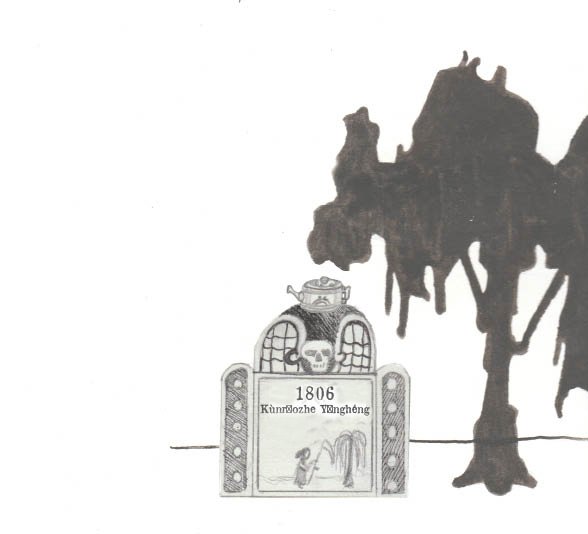 Morton gazed across the expanse of space before him and pushed his glasses higher on the bridge of his nose with the index finger of his right hand, not necessarily because they required adjusting, but more akin to how a drug addict would have nervously twitched when presented with a fix that lies physically within his grasp, but not as easily accessible as it appeared. This temptation was not a tantalizing pile of cocaine, however, but rather a deceptively innocuous teapot.
Morton gazed across the expanse of space before him and pushed his glasses higher on the bridge of his nose with the index finger of his right hand, not necessarily because they required adjusting, but more akin to how a drug addict would have nervously twitched when presented with a fix that lies physically within his grasp, but not as easily accessible as it appeared. This temptation was not a tantalizing pile of cocaine, however, but rather a deceptively innocuous teapot.
The time was now; the plans, albeit as simplistic in nature as they were, had been laid. Morton just had to solidify his resolve and order his legs to start moving across the snow covered ground that separated him from retrieving the object of his desire from its resting spot atop the granite crest of the grave stone.
Morton’s affection for teapots was the quintessential example of nature versus nurture, with nurture having won out. His memories of his mother were clouded and at that they were more an image of a hulking shape covered in a pearl gray pilled blanket, than of an actual person. Morton’s mother had been a seriously ill persona in his life, although he never did learn the true diagnosis of this mysterious ailment. Maybe it had been a devastating chronic condition with a terminal outcome. Or perhaps it had been related to an incapacitating mental frailty. Whatever the cause, Morton had had very little interaction with his mother as a child.
Morton’s maternal figure had by necessity become his Aunt Althea, his mother’s sister. Althea had taken charge of Morton’s upbringing once it had become apparent that her sister was incapable. She had moved Morton and his mother into her small, tidy Salem home as his mother’s decline in health had swiftly dictated. While she did not dispense a wealth of affection, she did make sure that Morton had all of his physical cares met in a very Maslow’s Hierarchy of Needs sort of manner; she clothed him, fed him, took him to doctors’ appointments, and made sure that he attended school each day.
And while not one for exhibiting any sentiment, Aunt Althea had discovered a kindred soul in Morton. Althea had a glass curio cabinet  in her formal living room that lovingly displayed an accumulation of acquired decorative china teapots. Early in his childhood, Morton had demonstrated a keen enthusiasm in his Aunt’s interest, riveted to the cabinet, gazing fixedly at each piece for long periods of time. He would ask his Aunt questions, tucking away the knowledge as it was imparted, never repeating the same query twice.
in her formal living room that lovingly displayed an accumulation of acquired decorative china teapots. Early in his childhood, Morton had demonstrated a keen enthusiasm in his Aunt’s interest, riveted to the cabinet, gazing fixedly at each piece for long periods of time. He would ask his Aunt questions, tucking away the knowledge as it was imparted, never repeating the same query twice.
“Where did this teapot come from, Aunt Althea? The one with the gold handle?” he would ask, or “How old is this teapot?”Aunt Althea felt that it was her role to foster young Morton’s eager interest in “the arts”, as she saw it. She would take him on weekly excursions to the Peabody Essex Museum, walking briskly holding his hand the short mile it took to get downtown where the museum was located. Althea did not believe in modes of transportation and utilized them only as necessity dictated she must.
At five foot two, Aunt Althea was not an imposing figure, but what she lacked for in stature, she made up for in her daunting no-nonsense demeanor. No shrinking violet was Althea. The only thing delicate about her, in fact, was her extensive, but selective, collection of teapots. Morton had experienced the extent of her severity on one occasion only.
They had stopped in a small shop on their way home from the museum one weekend, when Morton’s eye was caught by a miniature teapot. To be fair, Morton’s thought at that moment was a selfless one; Mothers’ Day was the very next day. And while Morton felt that the colorful tissue paper flowers that all the children had created in their kindergarten class that past week would more than suffice for the mother he hardly knew, he felt that something a bit more special was due to Aunt Althea. What better token of his appreciation than a replica of an object of which she was so fond?
While Althea was engaged in conversation with the store clerk, Morton slipped the teapot with its diminutive size quite easily into his own small coat pocket. Again, there was an innocence about Morton’s slyness; he was not secretive out of perceived guilt at what he was doing, as he had no notion that it was wrong at that time, but more so because he wanted the item to be a surprise for his aunt. Truth be told, this may actually have been a downfall of his aunt’s ministrations to his upbringing, since her attempts at education had been primarily concentrated on the arts, rather than the more basic societal norms, such as how civilized society frowned upon thievery.
Irregardless, the next morning Morton had proudly brought the tiny pretty out from its hiding place and presented it to his aunt with a smile. At first Althea had smiled in return, but quickly upon realizing how the item must have been acquired, the smile became a disapproving scowl.
In addition to their weekly Saturday trips to the museum, Aunt Althea and Morton attended Sunday mass at St. James church every Sabbath. Aunt Althea knew without doubt that the priest had included the eighth commandment in past services.
Althea looked at Morton and asked, “Morton, were you not paying attention when Father O’Brien was giving his sermons?”
Morton looked genuinely baffled by the question. “Auntie, I always pay attention in church,” he replied, “Just like you always tell me.”
Althea looked sternly at Morton, “Then did you not hear Father speak of the evils of stealing?” she asked, now equally as perplexed as her nephew.
I did hear the Father, Auntie,” Morton answered truthfully. “But I don’t know why you are mad. I didn’t steal.”
Althea contemplated this bit of information, before she replied. Maybe he didn’t understand what stealing actually meant.
“Well Morton, stealing is when you take something that does not belong to you,” Althea explained. “The teapot did not belong to you, nor did you pay for it.”
When Morton’s eyes widened at his aunt’s explanation, Althea knew she had assessed the situation correctly.
“I’m sorry, Auntie! I didn’t know that I was stealing!” Morton cried out, sincerely regretful for his actions.
Unfortunately for Morton, his Aunt had determined that his penance would not be complete with his apology to her.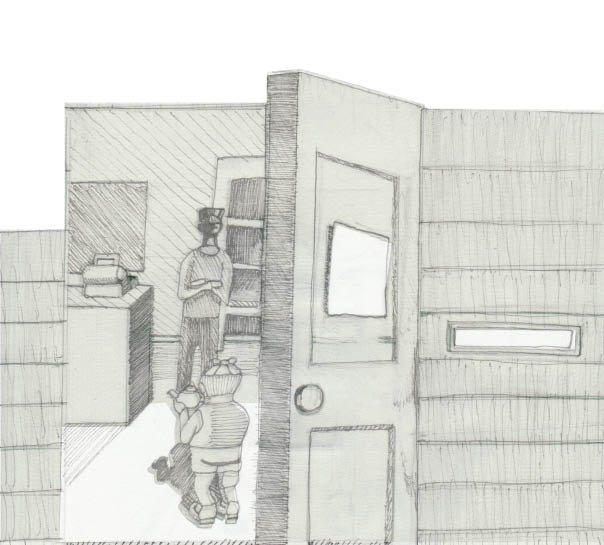
“I am glad that you understand what you did was wrong, Morton,” she stated, “but we will still have to go back to the shop so that you can return the teapot and make your apologies to the clerk.”
The very next day, as soon as Morton finished school, Althea made good on her word and marched him briskly downtown where shame-faced he returned the teapot to the shop clerk and told her that he was sorry and would never do it again. Andtrue to his word, in all the years hence, Morton had never stolen another thing. The guilt would have been unbearable.
___
Forty-five years later, the memory of that guilt was what now stood between Morton and the teapot on the gravestone. He had first caught a glimpse of the teapot a little over a year before when he had been going for his regular walk through the cemetery near his home.
While it might seem odd for a person to be taking leisurely strolls through a graveyard on a usual basis, this particular spot was known for its beautiful pond graced by two arching fountains in the summer months and its collection of trees uncommon to New England. In addition to being a final resting place for the deceased, Greenlawn Cemetery was an arboretum of sorts. And where there are trees, there are birds. Besides being a aficionado of teapots, Morton was also an enthusiastic bird watcher, a trait he had not inherited from his Aunt Althea. Maybe in this case it was nature that had won out over nurture; Morton really didn’t know for certain, as he knew so very little about his mother. Nevertheless, birding was one of his pastimes and he would frequent the quiet solitude of the cemetery, binoculars at the handy around his neck, in search of feathered species.
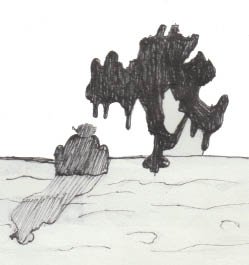 It was in doing so one day, when he was in the midst of tracking a Lesser Spotted Woodpecker as it descended a Kentucky Coffee tree, that he had caught the teapot in his field of vision. Morton had lowered the binoculars immediately, as if not quite trusting the tool and rather needing proof of his discovery with his own naked eye. Sure enough, the out-of-place treasure was perched on the grave stone upon which he had seen it.
It was in doing so one day, when he was in the midst of tracking a Lesser Spotted Woodpecker as it descended a Kentucky Coffee tree, that he had caught the teapot in his field of vision. Morton had lowered the binoculars immediately, as if not quite trusting the tool and rather needing proof of his discovery with his own naked eye. Sure enough, the out-of-place treasure was perched on the grave stone upon which he had seen it.
Cautiously, Morton had walked over to the gravestone, as if fearful that the teapot would take flight as the woodpecker had done. The pot was an exquisite blue and white hand painted porcelain with a stout cylinder-like shape, rather than a more rounded one. Fine fractures spider webbed through the pattern, as was common to age. Morton estimated a guess that this was a late 18th century piece from China, yet it was puzzling to him how it appeared to be in such perfect condition. He had seen much newer pieces in the Peabody Essex Museum, where he worked as a curator in the Asian Export wing, in far worse shape, safely kept behind their glass protected cases.
Over the year since his discovery, Morton had surreptitiously made his way over to the teapot at each visit to the cemetery. He had touched it, he had ran his hand over its smooth surface, he had even lifted the lid, but up until this point, he had not removed it from its resting spot. Now he stood before the grave, gathering his courage to do exactly that: remove the teapot, as he had been planning for the last year.
___
Subscribe to read more.
e-Issue $5.00
e-Subscription for a Year $10.00
Print issue: $12.25 + Shipping
Print Yearly Subscription: $66.00 + Shipping
The Thing on the Doorstep
by Howard Phillips Lovecraft
I.
It is true that I have sent six bullets through the head of my best friend, and yet I hope to shew by this statement that I am not his murderer. At first I shall be called a madman--madder than the man I shot in his cell at the Arkham Sanitarium. Later some of my readers will weigh each statement, correlate it with the known facts, and ask themselves how I could have believed otherwise than as I did after facing the evidence of that horror--that thing on the doorstep.
Until then I also saw nothing but madness in the wild tales I have acted on. Even now I ask myself whether I was misled--or whether I am not mad after all. I do not know--but others have strange things to tell of Edward and Asenath Derby, and even the stolid police are at their wits’ ends to account for that last terrible visit. They have tried weakly to concoct a theory of a ghastly jest or warning by discharged servants, yet they know in their hearts that the truth is something infinitely more terrible and incredible.
So I say that I have not murdered Edward Derby. Rather have I avenged him, and in so doing purged the earth of a horror whose survival might have loosed untold terrors on all mankind. There are black zones of shadow close to our daily paths, and now and then some evil soul breaks a passage through. When that happens, the man who knows must strike before reckoning the consequences.
I have known Edward Pickman Derby all his life. Eight years my junior, he was so precocious that we had much in common from the time he was eight and I sixteen. He was the most phenomenal child scholar I have ever known, and at seven was writing verse of a sombre, fantastic, almost morbid cast which astonished the tutors surrounding him. Perhaps his private education and coddled seclusion had something to do with his premature flowering. An only child, he had organic weaknesses which startled his doting parents and caused them to keep him closely chained to their side. He was never allowed out without his nurse, and seldom had a chance to play unconstrainedly with other children. All this doubtless fostered a strange, secretive inner life in the boy, with imagination as his one avenue of freedom.
At any rate, his juvenile learning was prodigious and bizarre; and his facile writings such as to captivate me despite my greater age. About that time I had leanings toward art of a somewhat grotesque cast, and I found in this younger child a rare kindred spirit. What lay behind our joint love of shadows and marvels was, no doubt, the ancient, mouldering, and subtly fearsome town in which we lived--witch-cursed, legend-haunted Arkham, whose huddled, sagging gambrel roofs and crumbling Georgian balustrades brood out the centuries beside the darkly muttering Miskatonic.
As time went by I turned to architecture and gave up my design of illustrating a book of Edward’s daemoniac poems, yet our comradeship suffered no lessening. Young Derby’s odd genius developed remarkably, and in his eighteenth year his collected nightmare-lyrics made a real sensation when issued under the title Azathoth and Other Horrors. He was a close correspondent of the notorious Baudelairean poet Justin Geoffrey, who wrote The People of the Monolith and died screaming in a madhouse in 1926 after a visit to a sinister, ill-regarded village in Hungary.
In self-reliance and practical affairs, however, Derby was greatly retarded because of his coddled existence. His health had improved, but his habits of childish dependence were fostered by overcareful parents; so that he never travelled alone, made independent decisions, or assumed responsibilities. It was early seen that he would not be equal to a struggle in the business or professional arena, but the family fortune was so ample that this formed no tragedy. As he grew to years of manhood he retained a deceptive aspect of boyishness. Blond and blue-eyed, he had the fresh complexion of a child; and his attempts to raise a moustache were discernible only with difficulty. His voice was soft and light, and his pampered, unexercised life gave him a juvenile chubbiness rather than the paunchiness of premature middle age. He was of good height, and his handsome face would have made him a notable gallant had not his shyness held him to seclusion and bookishness.
Derby’s parents took him abroad every summer, and he was quick to seize on the surface aspects of European thought and expression. His Poe-like talents turned more and more toward the decadent, and other artistic sensitivenesses and yearnings were half-aroused in him. We had great discussions in those days. I had been through Harvard, had studied in a Boston architect’s office, had married, and had finally returned to Arkham to practice my profession--settling in the family homestead in Saltonstall St. since my father had moved to Florida for his health. Edward used to call almost every evening, till I came to regard him as one of the household. He had a characteristic way of ringing the doorbell or sounding the knocker that grew to be a veritable code signal, so that after dinner I always listened for the familiar three brisk strokes followed by two more after a pause. Less frequently I would visit at his house and note with envy the obscure volumes in his constantly growing library.
___
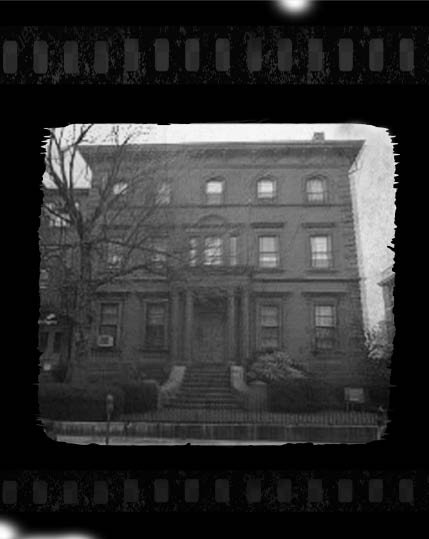
Derby went through Miskatonic University in Arkham, since his parents would not let him board away from them. He entered at sixteen and completed his course in three years, majoring in English and French literature and receiving high marks in everything but mathematics and the sciences. He mingled very little with the other students, though looking enviously at the “daring” or “Bohemian” set--whose superficially “smart” language and meaninglessly ironic pose he aped, and whose dubious conduct he wished he dared adopt.
What he did do was to become an almost fanatical devotee of subterranean magical lore, for which Miskatonic’s library was and is famous. Always a dweller on the surface of phantasy and strangeness, he now delved deep into the actual runes and riddles left by a fabulous past for the guidance or puzzlement of posterity. He read things like the frightful Book of Eibon, the Unaussprechlichen Kulten of von Junzt, and the forbidden Necronomicon of the mad Arab Abdul Alhazred, though he did not tell his parents he had seen them. Edward was twenty when my son and only child was born, and seemed pleased when I named the newcomer Edward Derby Upton, after him.
By the time he was twenty-five Edward Derby was a prodigiously learned man and a fairly well-known poet and fantaisiste, though his lack of contacts and responsibilities had slowed down his literary growth by making his products derivative and overbookish. I was perhaps his closest friend--finding him an inexhaustible mine of vital theoretical topics, while he relied on me for advice in whatever matters he did not wish to refer to his parents. He remained single--more through shyness, inertia, and parental protectiveness than through inclination--and moved in society only to the slightest and most perfunctory extent. When the war came both health and ingrained timidity kept him at home. I went to Plattsburg for a commission, but never got overseas.
So the years wore on. Edward’s mother died when he was thirty-four, and for months he was incapacitated by some odd psychological malady. His father took him to Europe, however, and he managed to pull out of his trouble without visible effects. Afterward he seemed to feel a sort of grotesque exhilaration, as if of partial escape from some unseen bondage. He began to mingle in the more “advanced” college set despite his middle age, and was present at some extremely wild doings--on one occasion paying heavy blackmail (which he borrowed of me) to keep his presence at a certain affair from his father’s notice. Some of the whispered rumours about the wild Miskatonic set were extremely singular. There was even talk of black magic and of happenings utterly beyond credibility.
II.
Edward was thirty-eight when he met Asenath Waite. She was, I judge, about twenty-three at the time; and was taking a special course in mediaeval metaphysics at Miskatonic. The daughter of a friend of mine had met her before--in the Hall School at Kingsport--and had been inclined to shun her because of her odd reputation. She was dark, smallish, and very good-looking except for overprotuberant eyes; but something in her expression alienated extremely sensitive people. It was, however, largely her origin and conversation which caused average folk to avoid her. She was one of the Innsmouth Waites, and dark legends have clustered for generations about crumbling, half-deserted Innsmouth and its people. There are tales of horrible bargains about the year 1850, and of a strange element “not quite human” in the ancient families of the run-down fishing port--tales such as only old-time Yankees can devise and repeat with proper awesomeness.
Asenath’s case was aggravated by the fact that she was Ephraim Waite’s daughter--the child of his old age by an unknown wife who always went veiled. Ephraim lived in a half-decayed mansion in Washington Street, Innsmouth, and those who had seen the place (Arkham folk avoid going to Innsmouth whenever they can) declared that the attic windows were always boarded, and that strange sounds sometimes floated from within as evening drew on. The old man was known to have been a prodigious magical student in his day, and legend averred that he could raise or quell storms at sea according to his whim. I had seen him once or twice in my youth as he came to Arkham to consult forbidden tomes at the college library, and had hated his wolfish, saturnine face with its tangle of iron-grey beard. He had died insane--under rather queer circumstances--just before his daughter (by his will made a nominal ward of the principal) entered the Hall School, but she had been his morbidly avid pupil and looked fiendishly like him at times.
The friend whose daughter had gone to school with Asenath Waite repeated many curious things when the news of Edward’s acquaintance with her began to spread about. Asenath, it seemed, had posed as a kind of magician at school; and had really seemed able to accomplish some highly baffling marvels. She professed to be able to raise thunderstorms, though her seeming success was generally laid to some uncanny knack at prediction. All animals markedly disliked her, and she could make any dog howl by certain motions of her right hand. There were times when she displayed snatches of knowledge and language very singular--and very shocking--for a young girl; when she would frighten her schoolmates with leers and winks of an inexplicable kind, and would seem to extract an obscene and zestful irony from her present situation.
Most unusual, though, were the well-attested cases of her influence over other persons. She was, beyond question, a genuine hypnotist. By gazing peculiarly at a fellow-student she would often give the latter a distinct feeling of exchanged personality--as if the subject were placed momentarily in the magician’s body and able to stare half across the room at her real body, whose eyes blazed and protruded with an alien expression. Asenath often made wild claims about the nature of consciousness and about its independence of the physical frame--or at least from the life-processes of the physical frame. Her crowning rage, however, was that she was not a man; since she believed a male brain had certain unique and far-reaching cosmic powers. Given a man’s brain, she declared, she could not only equal but surpass her father in mastery of unknown forces.

Edward met Asenath at a gathering of “intelligentsia” held in one of the students’ rooms, and could talk of nothing else when he came to see me the next day. He had found her full of the interests and erudition which engrossed him most, and was in addition wildly taken with her appearance. I had never seen the young woman, and recalled casual references only faintly, but I knew who she was. It seemed rather regrettable that Derby should become so upheaved about her; but I said nothing to discourage him, since infatuation thrives on opposition. He was not, he said, mentioning her to his father.
___
In the next few weeks I heard of very little but Asenath from young Derby. Others now remarked Edward’s autumnal gallantry, though they agreed that he did not look even nearly his actual age, or seem at all inappropriate as an escort for his bizarre divinity. He was only a trifle paunchy despite his indolence and self-indulgence, and his face was absolutely without lines. Asenath, on the other hand, had the premature crow’s feet which come from the exercise of an intense will.
About this time Edward brought the girl to call on me, and I at once saw that his interest was by no means one-sided. She eyed him continually with an almost predatory air, and I perceived that their intimacy was beyond untangling. Soon afterward I had a visit from old Mr. Derby, whom I had always admired and respected. He had heard the tales of his son’s new friendship, and had wormed the whole truth out of “the boy”. Edward meant to marry Asenath, and had even been looking at houses in the suburbs. Knowing my usually great influence with his son, the father wondered if I could help to break the ill-advised affair off; but I regretfully expressed my doubts. This time it was not a question of Edward’s weak will but of the woman’s strong will. The perennial child had transferred his dependence from the parental image to a new and stronger image, and nothing could be done about it.
The wedding was performed a month later--by a justice of the peace, according to the bride’s request. Mr. Derby, at my advice, offered no opposition; and he, my wife, my son, and I attended the brief ceremony--the other guests being wild young people from the college. Asenath had bought the old Crowninshield place in the country at the end of High Street, and they proposed to settle there after a short trip to Innsmouth, whence three servants and some books and household goods were to be brought. It was probably not so much consideration for Edward and his father as a personal wish to be near the college, its library, and its crowd of “sophisticates”, that made Asenath settle in Arkham instead of returning permanently home.
When Edward called on me after the honeymoon I thought he looked slightly changed. Asenath had made him get rid of the undeveloped moustache, but there was more than that. He looked soberer and more thoughtful, his habitual pout of childish rebelliousness being exchanged for a look almost of genuine sadness. I was puzzled to decide whether I liked or disliked the change. Certainly, he seemed for the moment more normally adult than ever before. Perhaps the marriage was a good thing--might not the change of dependence form a start toward actual neutralisation, leading ultimately to responsible independence? He came alone, for Asenath was very busy. She had brought a vast store of books and apparatus from Innsmouth (Derby shuddered as he spoke the name), and was finishing the restoration of the Crowninshield house and grounds.
Her home in--that town--was a rather disquieting place, but certain objects in it had taught him some surprising things. He was progressing fast in esoteric lore now that he had Asenath’s guidance. Some of the experiments she proposed were very daring and radical--he did not feel at liberty to describe them--but he had confidence in her powers and intentions. The three servants were very queer--an incredibly aged couple who had been with old Ephraim and referred occasionally to him and to Asenath’s dead mother in a cryptic way, and a swarthy young wench who had marked anomalies of feature and seemed to exude a perpetual odour of fish.
III.
For the next two years I saw less and less of Derby. A fortnight would sometimes slip by without the familiar three-and-two strokes at the front door; and when he did call--or when, as happened with increasing infrequency, I called on him--he was very little disposed to converse on vital topics. He had become secretive about those occult studies which he used to describe and discuss so minutely, and preferred not to talk of his wife. She had aged tremendously since her marriage, till now--oddly enough--she seemed the elder of the two. Her face held the most concentratedly determined expression I had ever seen, and her whole aspect seemed to gain a vague, unplaceable repulsiveness. My wife and son noticed it as much as I, and we all ceased gradually to call on her--for which, Edward admitted in one of his boyishly tactless moments, she was unmitigatedly grateful. Occasionally the Derbys would go on long trips--ostensibly to Europe, though Edward sometimes hinted at obscurer destinations.
It was after the first year that people began talking about the change in Edward Derby. It was very casual talk, for the change was purely psychological; but it brought up some interesting points. Now and then, it seemed, Edward was observed to wear an expression and to do things wholly incompatible with his usual flabby nature. For example--although in the old days he could not drive a car, he was now seen occasionally to dash into or out of the old Crowninshield driveway with Asenath’s powerful Packard, handling it like a master, and meeting traffic entanglements with a skill and determination utterly alien to his accustomed nature. In such cases he seemed always to be just back from some trip or just starting on one--what sort of trip, no one could guess, although he mostly favoured the Innsmouth road.
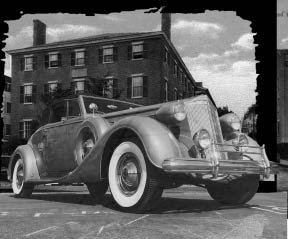
Oddly, the metamorphosis did not seem altogether pleasing. People said he looked too much like his wife, or like old Ephraim Waite himself, in these moments--or perhaps these moments seemed unnatural because they were so rare. Sometimes, hours after starting out in this way, he would return listlessly sprawled on the rear seat of the car while an obviously hired chauffeur or mechanic drove. Also, his preponderant aspect on the streets during his decreasing round of social contacts (including, I may say, his calls on me) was the old-time indecisive one--its irresponsible childishness even more marked than in the past. While Asenath’s face aged, Edward’s--aside from those exceptional occasions--actually relaxed into a kind of exaggerated immaturity, save when a trace of the new sadness or understanding would flash across it. It was really very puzzling. Meanwhile the Derbys almost dropped out of the gay college circle--not through their own disgust, we heard, but because something about their present studies shocked even the most callous of the other decadents.
It was in the third year of the marriage that Edward began to hint openly to me of a certain fear and dissatisfaction. He would let fall remarks about things ‘going too far’, and would talk darkly about the need of ‘saving his identity’. At first I ignored such references, but in time I began to question him guardedly, remembering what my friend’s daughter had said about Asenath’s hypnotic influence over the other girls at school--the cases where students had thought they were in her body looking across the room at themselves. This questioning seemed to make him at once alarmed and grateful, and once he mumbled something about having a serious talk with me later.

About this time old Mr. Derby died, for which I was afterward very thankful. Edward was badly upset, though by no means disorganised. He had seen astonishingly little of his parent since his marriage, for Asenath had concentrated in herself all his vital sense of family linkage. Some called him callous in his loss--especially since those jaunty and confident moods in the car began to increase. He now wished to move back into the old Derby mansion, but Asenath insisted on staying in the Crowninshield house, to which she had become well adjusted.
Not long afterward my wife heard a curious thing from a friend--one of the few who had not dropped the Derbys. She had been out to the end of High St. to call on the couple, and had seen a car shoot briskly out of the drive with Edward’s oddly confident and almost sneering face above the wheel. Ringing the bell, she had been told by the repulsive wench that Asenath was also out; but had chanced to look up at the house in leaving. There, at one of Edward’s library windows, she had glimpsed a hastily withdrawn face--a face whose expression of pain, defeat, and wistful hopelessness was poignant beyond description. It was--incredibly enough in view of its usual domineering cast--Asenath’s; yet the caller had vowed that in that instant the sad, muddled eyes of poor Edward were gazing out from it.
___
Subscribe to read more.
Dr. Heidegger Experiment
by Nathaniel Hawthorne
That very singular man old Dr. Heidegger once invited four venerable friends to meet him in his study. There were three white-bearded gentlemen--Mr. Medbourne, Colonel Killigrew and Mr. Gascoigne--and a withered gentlewoman whose name was the widow Wycherly. They were all melancholy old creatures who had been unfortunate in life, and whose greatest misfortune it was that they were not long ago in their graves.
Mr. Medbourne, in the vigor of his age, had been a prosperous merchant, but had lost his all by a frantic speculation, and was now little better than a mendicant. Colonel Killigrew had wasted his best years and his health and substance in the pursuit of sinful pleasures which had given birth to a brood of pains, such as the gout and divers other torments of soul and body. Mr. Gascoigne was a ruined politician, a man of evil fame--or, at least, had been so till time had buried him from the knowledge of the present generation and made him obscure instead of infamous. As for the widow Wycherly, tradition tells us that she was a great beauty in her day, but for a long while past she had lived in deep seclusion on account of certain scandalous stories which had prejudiced the gentry of the town against her. It is a circumstance worth mentioning that each of these three old gentlemen--Mr. Medbourne, Colonel Killigrew and Mr. Gascoigne--were early lovers of the widow Wycherly, and had once been on the point of cutting each other’s throats for her sake. And before proceeding farther I will merely hint that Dr. Heidegger and all his four guests were sometimes thought to be a little beside themselves, as is not infrequently the case with old people when worried either by present troubles or woeful recollections.
“My dear old friends,” said Dr. Heidegger, motioning them to be seated, “I am desirous of your assistance in one of those little experiments with which I amuse myself here in my study.”
If all stories were true, Dr. Heidegger’s study must have been a very curious place. It was a dim, old-fashioned chamber festooned with cobwebs and besprinkled with antique dust. Around the walls stood several oaken bookcases, the lower shelves of which were filled with rows of gigantic folios and black-letter quartos, and the upper with little parchment-covered duodecimos. Over the central bookcase was a bronze bust of Hippocrates, with which, according to some authorities, Dr. Heidegger was accustomed to hold consultations in all difficult cases of his practice. In the obscurest corner of the room stood a tall and narrow oaken closet with its door ajar, within which doubtfully appeared a skeleton. Between two of the bookcases hung a looking-glass, presenting its high and dusty plate within a tarnished gilt frame. Among many wonderful stories related of this mirror, it was fabled that the spirits of all the doctor’s deceased patients dwelt within its verge and would stare him in the face whenever he looked thitherward. The opposite side of the chamber was ornamented with the full-length portrait of a young lady arrayed in the faded magnificence of silk, satin and brocade, and with a visage as faded as her dress. Above half a century ago Dr. Heidegger had been on the point of marriage with this young lady, but, being affected with some slight disorder, she had swallowed one of her lover’s prescriptions and died on the bridal-evening. The greatest curiosity of the study remains to be mentioned: it was a ponderous folio volume bound in black leather, with massive silver clasps. There were no letters on the back, and nobody could tell the title of the book. But it was well known to be a book of magic, and once, when a chambermaid had lifted it merely to brush away the dust, the skeleton had rattled in its closet, the picture of the young lady had stepped one foot upon the floor and several ghastly faces had peeped forth from the mirror, while the brazen head of Hippocrates frowned and said, “Forbear!”
Such was Dr. Heidegger’s study. On the summer afternoon of our tale a small round table as black as ebony stood in the centre of the room, sustaining a cut-glass vase of beautiful form and elaborate workmanship. The sunshine came through the window between the heavy festoons of two faded damask curtains and fell directly across this vase, so that a mild splendor was reflected from it on the ashen visages of the five old people who sat around. Four champagne-glasses were also on the table.
“My dear old friends,” repeated Dr. Heidegger, “may I reckon on your aid in performing an exceedingly curious experiment?”
Now, Dr. Heidegger was a very strange old gentleman whose eccentricity had become the nucleus for a thousand fantastic stories. Some of these fables--to my shame be it spoken--might possibly be traced back to mine own veracious self; and if any passages of the present tale should startle the reader’s faith, I must be content to bear the stigma of a fiction-monger.
When the doctor’s four guests heard him talk of his proposed experiment, they anticipated nothing more wonderful than the murder of a mouse in an air-pump or the examination of a cobweb by the microscope, or some similar nonsense with which he was constantly in the habit of pestering his intimates. But without waiting for a reply Dr. Heidegger hobbled across the chamber and returned with the same ponderous folio bound in black leather which common report affirmed to be a book of magic. Undoing the silver clasps, he opened the volume and took from among its black-letter pages a rose, or what was once a rose, though now the green leaves and crimson petals had assumed one brownish hue and the ancient flower seemed ready to crumble to dust in the doctor’s hands.
“This rose,” said Dr. Heidegger, with a sigh--”this same withered and crumbling flower--blossomed five and fifty years ago. It was given me by Sylvia Ward, whose portrait hangs yonder, and I meant to wear it in my bosom at our wedding. Five and fifty years it has been treasured between the leaves of this old volume. Now, would you deem it possible that this rose of half a century could ever bloom again?”
“Nonsense!” said the widow Wycherly, with a peevish toss of her head. “You might as well ask whether an old woman’s wrinkled face could ever bloom again.”
“See!” answered Dr. Heidegger. He uncovered the vase and threw the faded rose into the water which it contained. At first it lay lightly on the surface of the fluid, appearing to imbibe none of its moisture. Soon, however, a singular change began to be visible. The crushed and dried petals stirred and assumed a deepening tinge of crimson, as if the flower were reviving from a deathlike slumber, the slender stalk and twigs of foliage became green, and there was the rose of half a century, looking as fresh as when Sylvia Ward had first given it to her lover. It was scarcely full-blown, for some of its delicate red leaves curled modestly around its moist bosom, within which two or three dewdrops were sparkling.
“That is certainly a very pretty deception,” said the doctor’s friends--carelessly, however, for they had witnessed greater miracles at a conjurer’s show. “Pray, how was it effected?”
“Did you never hear of the Fountain of Youth?” asked Dr. Heidegger, “which Ponce de Leon, the Spanish adventurer, went in search of two or three centuries ago?”
“But did Ponce de Leon ever find it?” said the widow Wycherly.
“No,” answered Dr. Heidegger, “for he never sought it in the right place. The famous Fountain of Youth, if I am rightly informed, is situated in the southern part of the Floridian peninsula, not far from Lake Macaco. Its source is overshadowed by several gigantic magnolias which, though numberless centuries old, have been kept as fresh as violets by the virtues of this wonderful water. An acquaintance of mine, knowing my curiosity in such matters, has sent me what you see in the vase.”
“Ahem!” said Colonel Killigrew, who believed not a word of the doctor’s story; “and what may be the effect of this fluid on the human frame?”
“You shall judge for yourself, my dear colonel,” replied Dr. Heidegger.--”And all of you, my respected friends, are welcome to so much of this admirable fluid as may restore to you the bloom of youth. For my own part, having had much trouble in growing old, I am in no hurry to grow young again. With your permission, therefore, I will merely watch the progress of the experiment.”
While he spoke Dr. Heidegger had been filling the four champagne-glasses with the water of the Fountain of Youth. It was apparently impregnated with an effervescent gas, for little bubbles were continually ascending from the depths of the glasses and bursting in silvery spray at the surface. As the liquor diffused a pleasant perfume, the old people doubted not that it possessed cordial and comfortable properties, and, though utter sceptics as to its rejuvenescent power, they were inclined to swallow it at once. But Dr. Heidegger besought them to stay a moment.
“Before you drink, my respectable old friends,” said he, “it would be well that, with the experience of a lifetime to direct you, you should draw up a few general rules for your guidance in passing a second time through the perils of youth. Think what a sin and shame it would be if, with your peculiar advantages, you should not become patterns of virtue and wisdom to all the young people of the age!”
The doctor’s four venerable friends made him no answer except by a feeble and tremulous laugh, so very ridiculous was the idea that, knowing how closely Repentance treads behind the steps of Error, they should ever go astray again.
“Drink, then,” said the doctor, bowing; “I rejoice that I have so well selected the subjects of my experiment.”
With palsied hands they raised the glasses to their lips. The liquor, if it really possessed such virtues as Dr. Heidegger imputed to it, could not have been bestowed on four human beings who needed it more woefully. They looked as if they had never known what youth or pleasure was, but had been the offspring of Nature’s dotage, and always the gray, decrepit, sapless, miserable creatures who now sat stooping round the doctor’s table without life enough in their souls or bodies to be animated even by the prospect of growing young again. They drank off the water and replaced their glasses on the table.
Assuredly, there was an almost immediate improvement in the aspect of the party--not unlike what might have been produced by a glass of generous wine--together with a sudden glow of cheerful sunshine, brightening over all their visages at once. There was a healthful suffusion on their cheeks instead of the ashen hue that had made them look so corpse-like. They gazed at one another, and fancied that some magic power had really begun to smooth away the deep and sad inscriptions which Father Time had been so long engraving on their brows. The widow Wycherly adjusted her cap, for she felt almost like a woman again.
“Give us more of this wondrous water,” cried they, eagerly. “We are younger, but we are still too old. Quick! give us more!”
“Patience, patience!” quoth Dr. Heidegger, who sat, watching the experiment with philosophic coolness. “You have been a long time growing old; surely you might be content to grow young in half an hour. But the water is at your service.” Again he filled their glasses with the liquor of youth, enough of which still remained in the vase to turn half the old people in the city to the age of their own grandchildren.
While the bubbles were yet sparkling on the brim the doctor’s four guests snatched their glasses from the table and swallowed the contents at a single gulp. Was it delusion? Even while the draught was passing down their throats it seemed to have wrought a change on their whole systems. Their eyes grew clear and bright; a dark shade deepened among their silvery locks: they sat around the table three gentlemen of middle age and a woman hardly beyond her buxom prime.
“My dear widow, you are charming!” cried Colonel Killigrew, whose eyes had been fixed upon her face while the shadows of age were flitting from it like darkness from the crimson daybreak.
The fair widow knew of old that Colonel Killigrew’s compliments were not always measured by sober truth; so she started up and ran to the mirror, still dreading that the ugly visage of an old woman would meet her gaze.
Meanwhile, the three gentlemen behaved in such a manner as proved that the water of the Fountain of Youth possessed some intoxicating qualities--unless, indeed, their exhilaration of spirits were merely a lightsome dizziness caused by the sudden removal of the weight of years. Mr. Gascoigne’s mind seemed to run on political topics, but whether relating to the past, present or future could not easily be determined, since the same ideas and phrases have been in vogue these fifty years. Now he rattled forth full-throated sentences about patriotism, national glory and the people’s right; now he muttered some perilous stuff or other in a sly and doubtful whisper, so cautiously that even his own conscience could scarcely catch the secret; and now, again, he spoke in measured accents and a deeply-deferential tone, as if a royal ear were listening to his well-turned periods. Colonel Killigrew all this time had been trolling forth a jolly bottle-song and ringing his glass in symphony with the chorus, while his eyes wandered toward the buxom figure of the widow Wycherly. On the other side of the table, Mr. Medbourne was involved in a calculation of dollars and cents with which was strangely intermingled a project for supplying the East Indies with ice by harnessing a team of whales to the polar icebergs. As for the widow Wycherly, she stood before the mirror courtesying and simpering to her own image and greeting it as the friend whom she loved better than all the world besides. She thrust her face close to the glass to see whether some long-remembered wrinkle or crow’s-foot had indeed vanished; she examined whether the snow had so entirely melted from her hair that the venerable cap could be safely thrown aside. At last, turning briskly away, she came with a sort of dancing step to the table.
“My dear old doctor,” cried she, “pray favor me with another glass.”
“Certainly, my dear madam--certainly,” replied the complaisant doctor. “See! I have already filled the glasses.”
There, in fact, stood the four glasses brimful of this wonderful water, the delicate spray of which, as it effervesced from the surface, resembled the tremulous glitter of diamonds.
It was now so nearly sunset that the chamber had grown duskier than ever, but a mild and moonlike splendor gleamed from within the vase and rested alike on the four guests and on the doctor’s venerable figure. He sat in a high-backed, elaborately-carved oaken arm-chair with a gray dignity of aspect that might have well befitted that very Father Time whose power had never been disputed save by this fortunate company. Even while quaffing the third draught of the Fountain of Youth, they were almost awed by the expression of his mysterious visage. But the next moment the exhilarating gush of young life shot through their veins. They were now in the happy prime of youth. Age, with its miserable train of cares and sorrows and diseases, was remembered only as the trouble of a dream from which they had joyously awoke. The fresh gloss of the soul, so early lost and without which the world’s successive scenes had been but a gallery of faded pictures, again threw its enchantment over all their prospects. They felt like new-created beings in a new-created universe.
“We are young! We are young!” they cried, exultingly.
Youth, like the extremity of age, had effaced the strongly-marked characteristics of middle life and mutually assimilated them all. They were a group of merry youngsters almost maddened with the exuberant frolicsomeness of their years. The most singular effect of their gayety was an impulse to mock the infirmity and decrepitude of which they had so lately been the victims. They laughed loudly at their old-fashioned attire--the wide-skirted coats and flapped waistcoats of the young men and the ancient cap and gown of the blooming girl. One limped across the floor like a gouty grandfather; one set a pair of spectacles astride of his nose and pretended to pore over the black-letter pages of the book of magic; a third seated himself in an arm-chair and strove to imitate the venerable dignity of Dr. Heidegger. Then all shouted mirthfully and leaped about the room.
The widow Wycherly--if so fresh a damsel could be called a widow--tripped up to the doctor’s chair with a mischievous merriment in her rosy face.
“Doctor, you dear old soul,” cried she, “get up and dance with me;” and then the four young people laughed louder than ever to think what a queer figure the poor old doctor would cut.
“Pray excuse me,” answered the doctor, quietly. “I am old and rheumatic, and my dancing-days were over long ago. But either of these gay young gentlemen will be glad of so pretty a partner.”
“Dance with me, Clara,” cried Colonel Killigrew.
“No, no! I will be her partner,” shouted Mr. Gascoigne.
“She promised me her hand fifty years ago,” exclaimed Mr. Medbourne.
They all gathered round her. One caught both her hands in his passionate grasp, another threw his arm about her waist, the third buried his hand among the glossy curls that clustered beneath the widow’s cap. Blushing, panting, struggling, chiding, laughing, her warm breath fanning each of their faces by turns, she strove to disengage herself, yet still remained in their triple embrace. Never was there a livelier picture of youthful rivalship, with bewitching beauty for the prize. Yet, by a strange deception, owing to the duskiness of the chamber and the antique dresses which they still wore, the tall mirror is said to have reflected the figures of the three old, gray, withered grand-sires ridiculously contending for the skinny ugliness of a shrivelled grandam. But they were young: their burning passions proved them so.
Inflamed to madness by the coquetry of the girl-widow, who neither granted nor quite withheld her favors, the three rivals began to interchange threatening glances. Still keeping hold of the fair prize, they grappled fiercely at one another’s throats. As they struggled to and fro the table was overturned and the vase dashed into a thousand fragments. The precious Water of Youth flowed in a bright stream across the floor, moistening the wings of a butterfly which, grown old in the decline of summer, had alighted there to die. The insect fluttered lightly through the chamber and settled on the snowy head of Dr. Heidegger.
“Come, come, gentlemen! Come, Madam Wycherly!” exclaimed the doctor. “I really must protest against this riot.”
They stood still and shivered, for it seemed as if gray Time were calling them back from their sunny youth far down into the chill and darksome vale of years. They looked at old Dr. Heidegger, who sat in his carved armchair holding the rose of half a century, which he had rescued from among the fragments of the shattered vase. At the motion of his hand the four rioters resumed their seats--the more readily because their violent exertions had wearied them, youthful though they were.
“My poor Sylvia’s rose!” ejaculated Dr. Heidegger, holding it in the light of the sunset clouds. “It appears to be fading again.”
And so it was. Even while the party were looking at it the flower continued to shrivel up, till it became as dry and fragile as when the doctor had first thrown it into the vase. He shook off the few drops of moisture which clung to its petals.
“I love it as well thus as in its dewy freshness,” observed he, pressing the withered rose to his withered lips.
While he spoke the butterfly fluttered down from the doctor’s snowy head and fell upon the floor. His guests shivered again. A strange dullness--whether of the body or spirit they could not tell--was creeping gradually over them all. They gazed at one another, and fancied that each fleeting moment snatched away a charm and left a deepening furrow where none had been before. Was it an illusion? Had the changes of a lifetime been crowded into so brief a space, and were they now four aged people sitting with their old friend Dr. Heidegger?
“Are we grown old again so soon?” cried they, dolefully.
In truth, they had. The Water of Youth possessed merely a virtue more transient than that of wine; the delirium which it created had effervesced away. Yes, they were old again. With a shuddering impulse that showed her a woman still, the widow clasped her skinny hands before her face and wished that the coffin-lid were over it, since it could be no longer beautiful.
“Yes, friends, ye are old again,” said Dr. Heidegger, “and, lo! the Water of Youth is all lavished on the ground. Well, I bemoan it not; for if the fountain gushed at my very doorstep, I would not stoop to bathe my lips in it--no, though its delirium were for years instead of moments. Such is the lesson ye have taught me.”
But the doctor’s four friends had taught no such lesson to themselves. They resolved forthwith to make a pilgrimage to Florida and quaff at morning, noon and night from the Fountain of Youth.

The next story was inspired by the Joseph White murder that had happened in the house to the right of where the house now stands that featured prominently at the end of the previous story to this one. A murder that also inspired the Parker Brothers to shape the game Clue around it.
The Tell-Tale Heart
by Edgar Allan Poe
TRUE!--nervous--very, very dreadfully nervous I had been and am; but why will you say that I am mad? The disease had sharpened my senses--not destroyed--not dulled them. Above all was the sense of hearing acute. I heard all things in the heaven and in the earth. I heard many things in hell. How, then, am I mad? Hearken! and observe how healthily--how calmly I can tell you the whole story.
It is impossible to say how first the idea entered my brain; but once conceived, it haunted me day and night. Object there was none. Passion there was none. I loved the old man. He had never wronged me. He had never given me insult. For his gold I had no desire. I think it was his eye! yes, it was this! He had the eye of a vulture--a pale blue eye, with a film over it. Whenever it fell upon me, my blood ran cold; and so by degrees--very gradually--I made up my mind to take the life of the old man, and thus rid myself of the eye forever.

Now this is the point. You fancy me mad. Madmen know nothing. But you should have seen me. You should have seen how wisely I proceeded--with what caution--with what foresight--with what dissimulation I went to work! I was never kinder to the old man than during the whole week before I killed him. And every night, about midnight, I turned the latch of his door and opened it--oh so gently! And then, when I had made an opening sufficient for my head, I put in a dark lantern, all closed, closed, that no light shone out, and then I thrust in my head. Oh, you would have laughed to see how cunningly I thrust it in! I moved it slowly--very, very slowly, so that I might not disturb the old man’s sleep. It took me an hour to place my whole head within the opening so far that I could see him as he lay upon his bed. Ha! would a madman have been so wise as this? And then, when my head was well in the room, I undid the lantern cautiously--oh, so cautiously--cautiously (for the hinges creaked)--I undid it just so much that a single thin ray fell upon the vulture eye. And this I did for seven long nights--every night just at midnight--but I found the eye always closed; and so it was impossible to do the work; for it was not the old man who vexed me, but his Evil Eye. And every morning, when the day broke, I went boldly into the chamber, and spoke courageously to him, calling him by name in a hearty tone, and inquiring how he has passed the night. So you see he would have been a very profound old man, indeed, to suspect that every night, just at twelve, I looked in upon him while he slept.
Upon the eighth night I was more than usually cautious in opening the door. A watch’s minute hand moves more quickly than did mine. Never before that night had I felt the extent of my own powers--of my sagacity. I could scarcely contain my feelings of triumph. To think that there I was, opening the door, little by little, and he not even to dream of my secret deeds or thoughts. I fairly chuckled at the idea; and perhaps he heard me; for he moved on the bed suddenly, as if startled. Now you may think that I drew back--but no. His room was as black as pitch with the thick darkness, (for the shutters were close fastened, through fear of robbers,) and so I knew that he could not see the opening of the door, and I kept pushing it on steadily, steadily.
I had my head in, and was about to open the lantern, when my thumb slipped upon the tin fastening, and the old man sprang up in bed, crying out--“Who’s there?”
I kept quite still and said nothing. For a whole hour I did not move a muscle, and in the meantime I did not hear him lie down. He was still sitting up in the bed listening;--just as I have done, night after night, hearkening to the death watches in the wall.
Presently I heard a slight groan, and I knew it was the groan of mortal terror. It was not a groan of pain or of grief--oh, no!--it was the low stifled sound that arises from the bottom of the soul when overcharged with awe. I knew the sound well. Many a night, just at midnight, when all the world slept, it has welled up from my own bosom, deepening, with its dreadful echo, the terrors that distracted me. I say I knew it well. I knew what the old man felt, and pitied him, although I chuckled at heart. I knew that he had been lying awake ever since the first slight noise, when he had turned in the bed. His fears had been ever since growing upon him. He had been trying to fancy them causeless, but could not. He had been saying to himself--“It is nothing but the wind in the chimney--it is only a mouse crossing the floor,” or “It is merely a cricket which has made a single chirp.” Yes, he had been trying to comfort himself with these suppositions: but he had found all in vain. All in vain; because Death, in approaching him had stalked with his black shadow before him, and enveloped the victim. And it was the mournful influence of the unperceived shadow that caused him to feel--although he neither saw nor heard--to feel the presence of my head within the room.
When I had waited a long time, very patiently, without hearing him lie down, I resolved to open a little--a very, very little crevice in the lantern. So I opened it--you cannot imagine how stealthily, stealthily--until, at length a simple dim ray, like the thread of the spider, shot from out the crevice and fell full upon the vulture eye.

It was open--wide, wide open--and I grew furious as I gazed upon it. I saw it with perfect distinctness--all a dull blue, with a hideous veil over it that chilled the very marrow in my bones; but I could see nothing else of the old man’s face or person: for I had directed the ray as if by instinct, precisely upon the damned spot.
And have I not told you that what you mistake for madness is but over-acuteness of the sense?--now, I say, there came to my ears a low, dull, quick sound, such as a watch makes when enveloped in cotton. I knew that sound well, too. It was the beating of the old man’s heart. It increased my fury, as the beating of a drum stimulates the soldier into courage.
But even yet I refrained and kept still. I scarcely breathed. I held the lantern motionless. I tried how steadily I could maintain the ray upon the eve. Meantime the hellish tattoo of the heart increased. It grew quicker and quicker, and louder and louder every instant. The old man’s terror must have been extreme! It grew louder, I say, louder every moment!--do you mark me well I have told you that I am nervous: so I am. And now at the dead hour of the night, amid the dreadful silence of that old house, so strange a noise as this excited me to uncontrollable terror. Yet, for some minutes longer I refrained and stood still. But the beating grew louder, louder! I thought the heart must burst. And now a new anxiety seized me--the sound would be heard by a neighbour! The old man’s hour had come! With a loud yell, I threw open the lantern and leaped into the room. He shrieked once--once only. In an instant I dragged him to the floor, and pulled the heavy bed over him. I then smiled gaily, to find the deed so far done. But, for many minutes, the heart beat on with a muffled sound. This, however, did not vex me; it would not be heard through the wall. At length it ceased. The old man was dead. I removed the bed and examined the corpse. Yes, he was stone, stone dead. I placed my hand upon the heart and held it there many minutes. There was no pulsation. He was stone dead. His eye would trouble me no more.
If still you think me mad, you will think so no longer when I describe the wise precautions I took for the concealment of the body. The night waned, and I worked hastily, but in silence. First of all I dismembered the corpse. I cut off the head and the arms and the legs.
I then took up three planks from the flooring of the chamber, and deposited all between the scantlings. I then replaced the boards so cleverly, so cunningly, that no human eye--not even his--could have detected any thing wrong. There was nothing to wash out--no stain of any kind--no blood-spot whatever. I had been too wary for that. A tub had caught all--ha! ha!
When I had made an end of these labors, it was four o’clock--still dark as midnight. As the bell sounded the hour, there came a knocking at the street door. I went down to open it with a light heart,--for what had I now to fear? There entered three men, who introduced themselves, with perfect suavity, as officers of the police. A shriek had been heard by a neighbour during the night; suspicion of foul play had been aroused; information had been lodged at the police office, and they (the officers) had been deputed to search the premises.
I smiled,--for what had I to fear? I bade the gentlemen welcome. The shriek, I said, was my own in a dream. The old man, I mentioned, was absent in the country. I took my visitors all over the house. I bade them search--search well. I led them, at length, to his chamber. I showed them his treasures, secure, undisturbed. In the enthusiasm of my confidence, I brought chairs into the room, and desired them here to rest from their fatigues, while I myself, in the wild audacity of my perfect triumph, placed my own seat upon the very spot beneath which reposed the corpse of the victim.

The officers were satisfied. My manner had convinced them. I was singularly at ease. They sat, and while I answered cheerily, they chatted of familiar things. But, ere long, I felt myself getting pale and wished them gone. My head ached, and I fancied a ringing in my ears: but still they sat and still chatted. The ringing became more distinct:--It continued and became more distinct: I talked more freely to get rid of the feeling: but it continued and gained definiteness--until, at length, I found that the noise was not within my ears.
No doubt I now grew very pale;--but I talked more fluently, and with a heightened voice. Yet the sound increased--and what could I do? It was a low, dull, quick sound--much such a sound as a watch makes when enveloped in cotton. I gasped for breath--and yet the officers heard it not. I talked more quickly--more vehemently; but the noise steadily increased. I arose and argued about trifles, in a high key and with violent gesticulations; but the noise steadily increased. Why would they not be gone? I paced the floor to and fro with heavy strides, as if excited to fury by the observations of the men--but the noise steadily increased. Oh God! what could I do? I foamed--I raved--I swore! I swung the chair upon which I had been sitting, and grated it upon the boards, but the noise arose over all and continually increased. It grew louder--louder--louder! And still the men chatted pleasantly, and smiled. Was it possible they heard not? Almighty God!--no, no! They heard!--they suspected!--they knew!--they were making a mockery of my horror!-this I thought, and this I think. But anything was better than this agony! Anything was more tolerable than this derision! I could bear those hypocritical smiles no longer! I felt that I must scream or die! and now--again!--hark! louder! louder! louder! louder!
“Villains!” I shrieked, “dissemble no more! I admit the deed!--tear up the planks! here, here!--It is the beating of his hideous heart!”
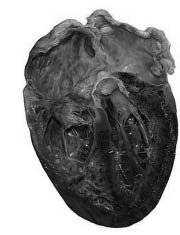 The End
The End

Daniel Webster was the prosecutor in the Joseph White murder that inspired Poe’s story above. Later Daniel Webster was offered to take the Parkerman-Webster Murder Case as the prosecutor, which he outright refused! Why you may ask.
The presiding Judge was Lemuel Shaw who he had hand picked after his complicity in the death of Chief Justice Isaac Parker in the Captain Joseph White murder. Isaac Parker died on the night of the first trial. Plus the suspect in the new murder, who like the man in the our tale had dismembered the corpse, was John White Webster.
Webster was a Harvard professor who was caught incinerating his landlord’s body within the confines of the university and stuffing the rest in a tea chest. Was the man who was murdered, Parkerman, ringing disquiet memories of a time Daniel Webster might of killed a man named Parker for the father-in-law of his son, a man named Stephen White?
Also Daniel might of been a little spooked for he might of sent a historian named Prescott to deliver a poison which was to kill president Zachary Taylor. Prescott had diner with the Harvard Professor’s son right before he got caught for murder. In fact, Prescott suffered stomach pains while travelling to Washington D.C. Within a few weeks of Prescott’s dinner with Taylor, Taylor will die of Typhoid.
Just as the first Whig president Webster had served as Secretary of State. The only difference was that William Harrison only survived one month in office while Taylor lasted a whole 15 months longer before he succumbed to the same fate. Just 13 months after x-president James Knox Polk dies from Typhoid after meeting a doctor on a riverboat who was present at Harrison’s death. Just more tales from the Flipside of a town known as Arkham.
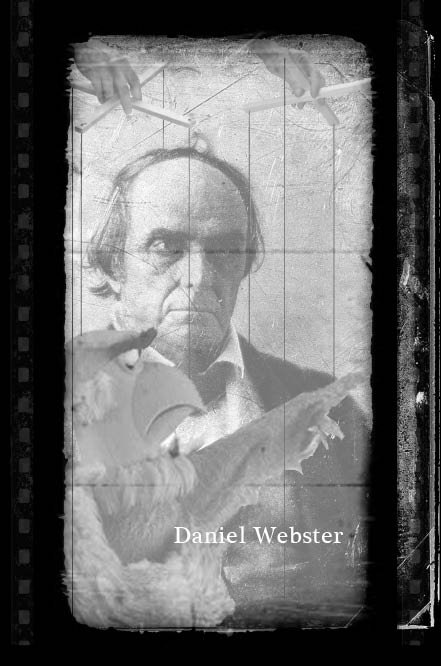
e-Issue $5.00
e-Subscription for a Year $10.00
Print issue: $12.25 + Shipping
Print Yearly Subscription: $66.00 + Shipping
Summer Cottage from Hell
Continued...
Subscribe to read the end of the cliffhanger from the Sinclair Narratives. For now you can read for free installments of Murder on the Common featuring Henry Sinclair every Tuesday. This is the first novel in the Sinclair Narratives.
Read new installments of the story every Tuesday at http://www.salemhousepress.com/Arkham/Sinclair.html up to its release in April 2020 at the largest gathering in the world playing Clue.
Visit www.salemhousepress.com for more info.

Flip these cards over and as easy as snapping a picture of the QR code on the back instantaneously have a fabulous new eBook on your device.
Look for them at your local stores!
OUR AUTHORS and ILLUSTRATORS
Summer Cottage from Hell
Christopher Jon Luke Dowgin: Author & Illustrator
The Wheel
Matthew Maguire: Author & Illustrator
THE EYES HAVE IT
Randall Garrett: Author
John Schoenherr: Illustrator
Teavanna
Lisa Deschenes: Author
Illustrator: Christopher Jon Luke Dowgin
The Thing on the Doorstep
Howard Phillips Lovecraft: Author
Christopher Jon Luke Dowgin: Illustrator
Dr. Heidegger Experiment
Nathaniel Hawthorne: Author
Christopher Jon Luke Dowgin: Illustrator
The Tell-Tale Heart
Edgar Allan Poe: Author
Christopher Jon Luke Dowgin: Illustrator
Bio...
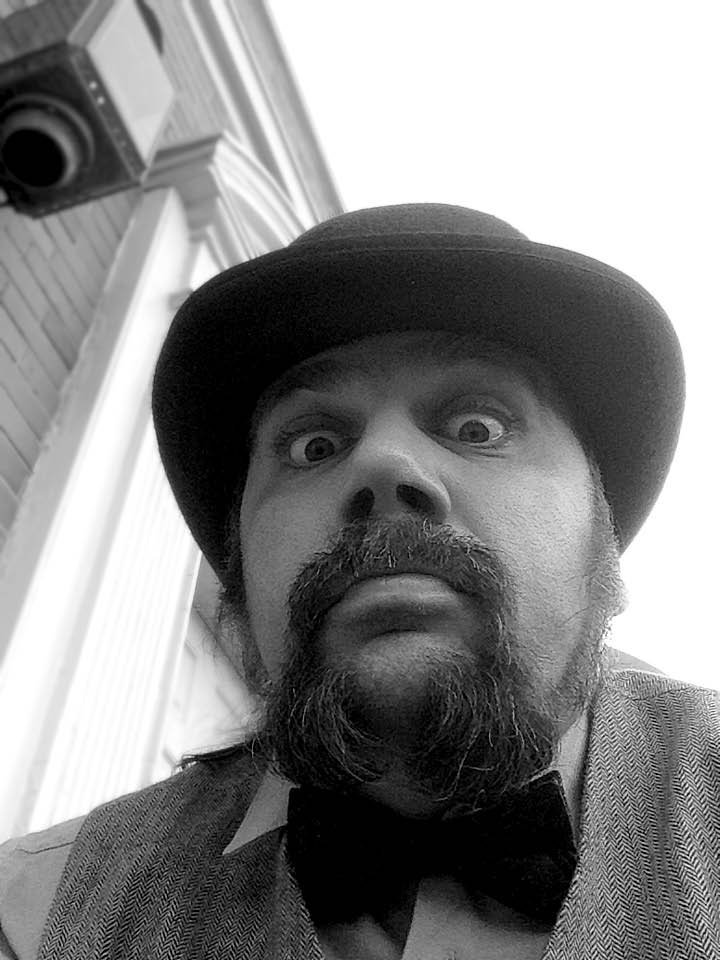
Christopher Jon Luke Dowgin:
Author and illustrator. Chris has written over 16 books of which 14 he has illustrated including The Salem Trilogy, Tales from Mr. Pelinger’s House, Max Teller’s Amazing Adventure, and Tyler Moves to Gibsonton Florida. He is also the creator of the Sinclair Narratives which Summer Cottage from Hell is one of the many short stories from the series. Look for the first novel of the Sinclair Narratives in April 2020, Murder on the Common. Till then you can read new installments of the book every Tuesday at: www.salemhousepress.com/Arkham/Sinclair.html.

Matthew Maguire:
Author and Illustrator. Matt was the artist for Wolverine from Marvel in 2001. He has worked with Top Cow and Kitchen Sink comics. Matt has also done several Heavy Metal Comics including a 54 page story for them called Call of the Loc Nar.
He can be found at his top notch Tattoo Gallery called Compass Rose Ink in Gloucester MA.
www.compassroseink.com.
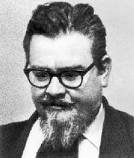
Randall Garrett (December 16, 1927 – December 31, 1987):
Author. He was a contributor to Astounding and other science fiction magazines of the 1950’s and 1960’s. Garrett is best known for the Lord Darcy books -- the novel Too Many Magicians and two short story collections -- set in an alternate world where a joint Anglo-French empire still led by a Plantagenet dynasty has survived into the twentieth century and where magic works and has been scientifically codified. The Eyes Have It was part of the Lord Darcy series. He was also a founding member of the Society for Creative Anachronism. Frank Herbert said 'You could follow his movements around this creative Anachronists’ picnic by the squeals of the women whose bottoms he had just pinched'. Many of the female sci-fi writers of the day had problems with him.

John Schoenherr (July 5, 1935 – April 8, 2010):
Illustrator. John Schoenherr may be known best as the original illustrator of the dust jacket art of Dune by Frank Herbert. that inaugurated a book series and media franchise. He had previously illustrated the serializations of the novel in Analog, which won him a 1965 Hugo Award for Best Professional Artist. He later did the art for the Analog serialization of Children of Dune. In 1978 Berkley Books published The Illustrated Dune, with his work. Among the books he illustrated are The Wolfling and Rascal by Sterling North (a Newbery Honor Book). In Analog, he also illustrated the first Dragonriders of Pern stories by Anne McCaffrey, who Garrett had offended while she was pregnant by some lewd suggestion. He is also a 1998 Caldecott Winner for Owl Moon by Jane Yolen. Also created the inspiration for Chewbacca.

Lisa Deschenes:
Author. We are proud to publish Lisa’s first published story of many to come. She is an early development educator and professor at Endicott College. She has lived in Salem her whole life and thrives in its 12 month out of the year Halloweenesque flavor. An avid car collector.
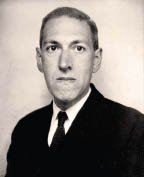
H.P. Lovecraft (August 20, 1890 – March 15, 1937):
Author. Gothic writer who had many series continue his mythology into their works like Conan the Barbarian and Batman. Lovecraft visited Salem from his hometown Providence Rhode Island in the summers of 1923 and 1924. While here he made a fictional town called Arkham that ran from the present day Salem to Ipswich. The Bentley-Crownishield House is just one location in Salem to feature in his short fiction. This house was also the brith place of Jacob Crowninshield who brought a drunken elephant to America. On board the ship was Nathaniel Hawthorne’s father bringing the first elephant to America.
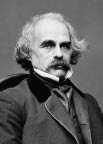
Nathaniel Hawthorne (July 4, 1804 – May 19, 1864):
Author. At the beginning of the story Summer Cottage from Hell it would have been Hawthorne’s 105th birthday. In 1830 Hawthorne chose to put the ‘W’ in his name while reporting for the Salem Gazette the murder of Joseph White which is featured in Murder on the Common. 1830 was also the first year his short fiction was published, anonymously though in the paper... His best work appeared in short fiction anthologies like Twice Told Tales and Tanglewood Tales. His father was indeed on the America in 1796 captained by Jacob Crowninshield when he sent a letter to his son that an elephant was on board, though he would die at sea in 1808.
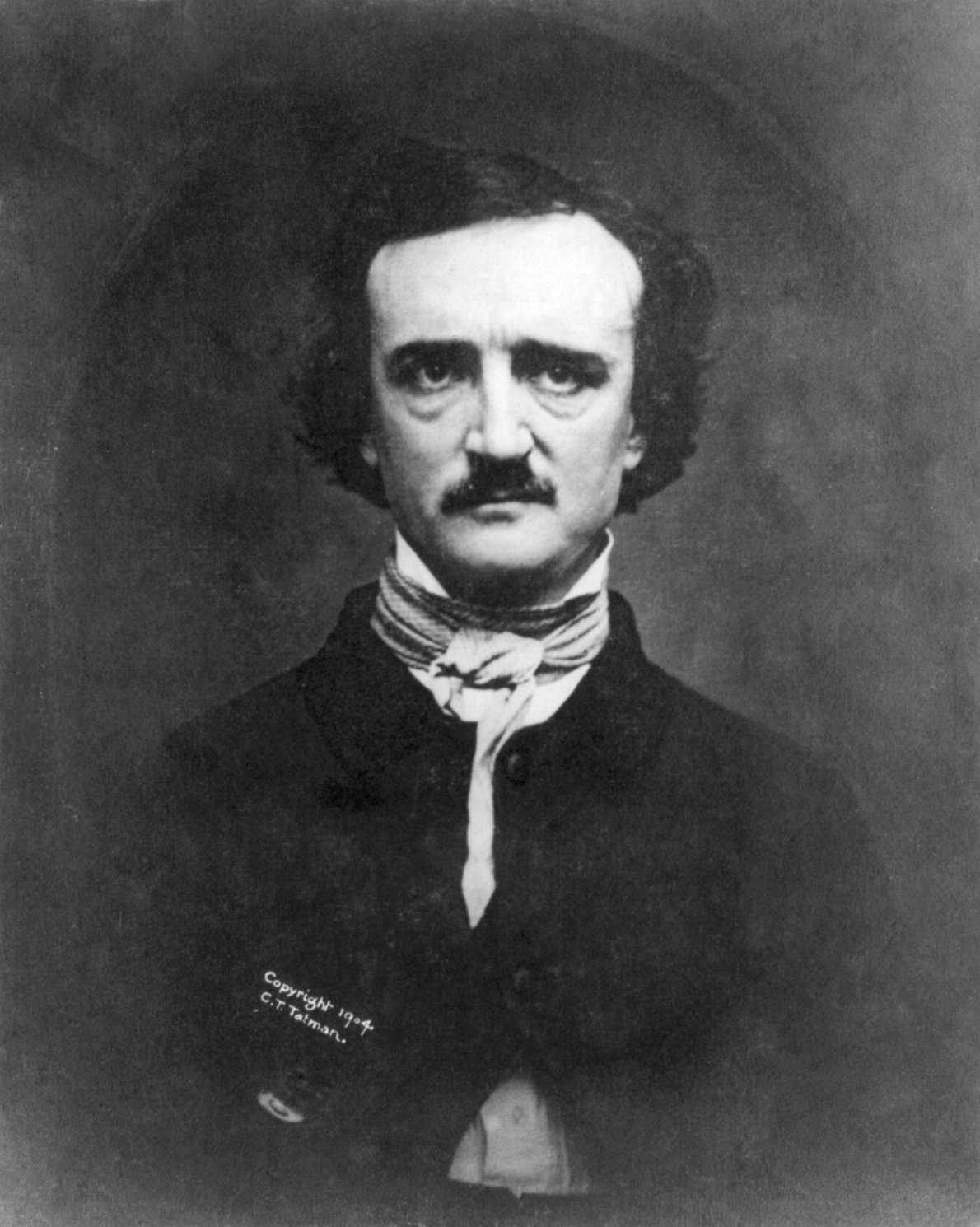
Edgar Allan Poe (January 19, 1809 – October 7, 1849)
Author. When Taft was moving his Summer White House to Beverly, MA Poe would have been just over a hundred years old. Poe did try to proposition Robert Tyler, the son of the president, to receive a position in the Philadelphia Custom House. He feigned being sick and Robert believed he was drunk which caused him to miss a meeting to talk about the position. Poe’s mother and sister performed at the Federal Street Theater in Boston and received ovations, but Poe probably had to sneak out through the tunnels in the basement for shame. Though Poe didn’t get the patronage job in the Custom House, Nathaniel did in Salem and Boston. Then his friend President Pierce appointed him United States Consul to Liverpool. Poe’s Tell-Tale Heart is influence by the death of the ship captain Joseph White which is in Murder on the Common.
If you have not figured it out, these stories were picked because of The Wheel in which they circle and spiral out of each other. The teapot in Teavanna appears in Summer Cottage from Hell. Summer Cottage from Hell references people and monsters from The Thing on the Doorstep. The Crowninshield-Bentley House's doorstep Nathaniel Hawthorne could of stepped across with his father visiting the ship captain he sailed under. At one time the elephant would have looked like some Lovecraft monster with its long trunk and massive bulk. The Eyes Have It is a murder mystery, like most of the tales in this collection. The Hawthorne story was Poe's favorite. Poe invented the murder mystery...
Nothing new for Arkham! Tales vibrate and pulse out and back in theirselves here in the Flipside.
Look for a new issue of our Quarterly in the Spring of 2020.
~ Professor Albert N. Wilmarth
Miskatonic University
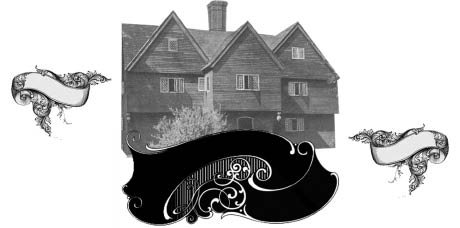 This is Professor Wilmarth and your friendly neighborhood Cthulhu welcoming you to another journey within the world of the macabre and the strange. In this season’s issue we have several tales of murder, deceit, and possession that turn like a wheel and spiral into one another. Tales from new masters and old. We have Poe, Hawthorne, Lovecraft, and Garrett along with this generation of masters Deschenes, Dowgin, and Maguire.
This is Professor Wilmarth and your friendly neighborhood Cthulhu welcoming you to another journey within the world of the macabre and the strange. In this season’s issue we have several tales of murder, deceit, and possession that turn like a wheel and spiral into one another. Tales from new masters and old. We have Poe, Hawthorne, Lovecraft, and Garrett along with this generation of masters Deschenes, Dowgin, and Maguire. 
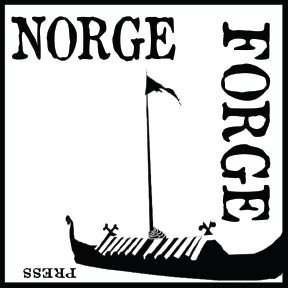
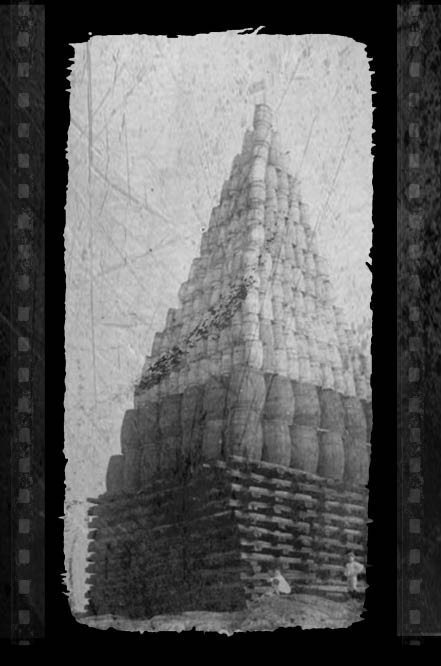



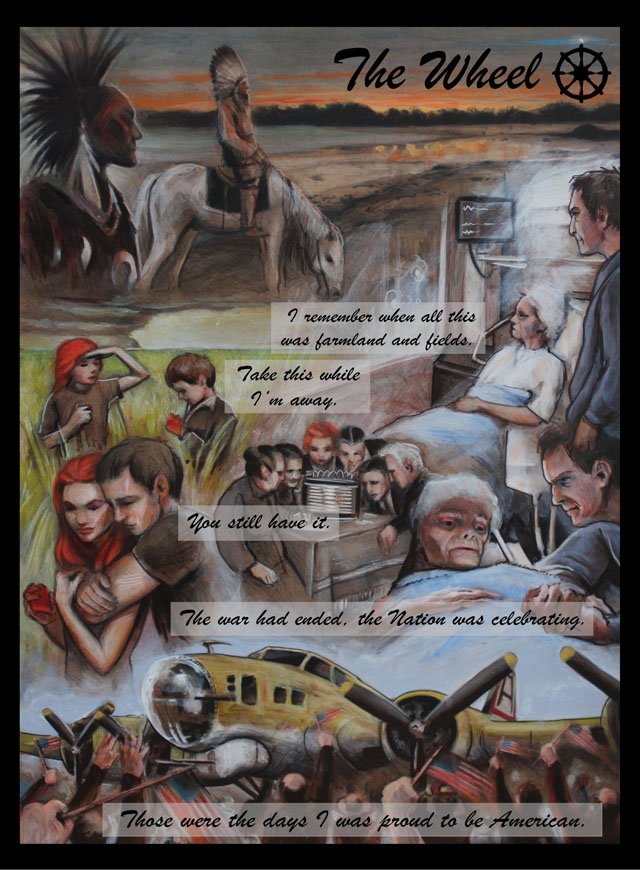
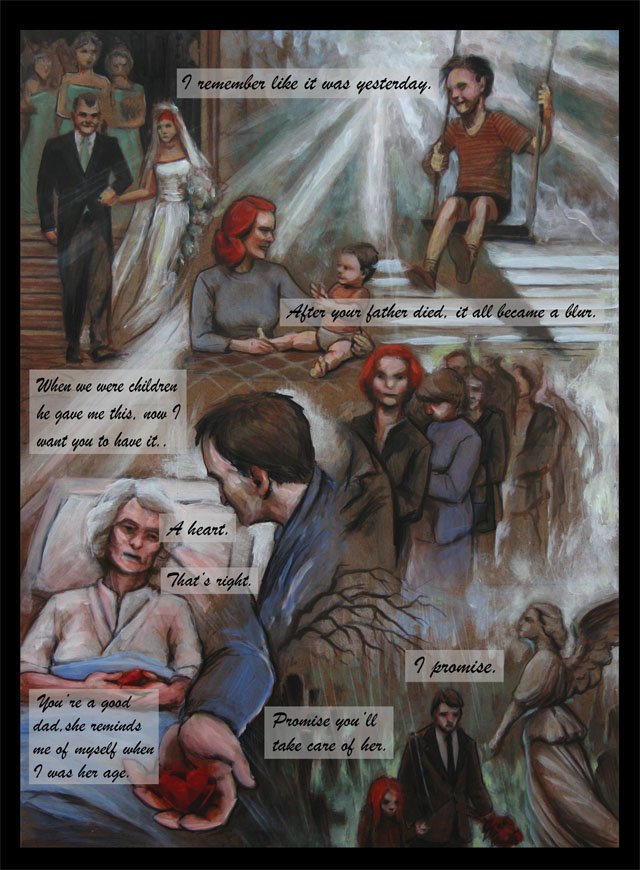
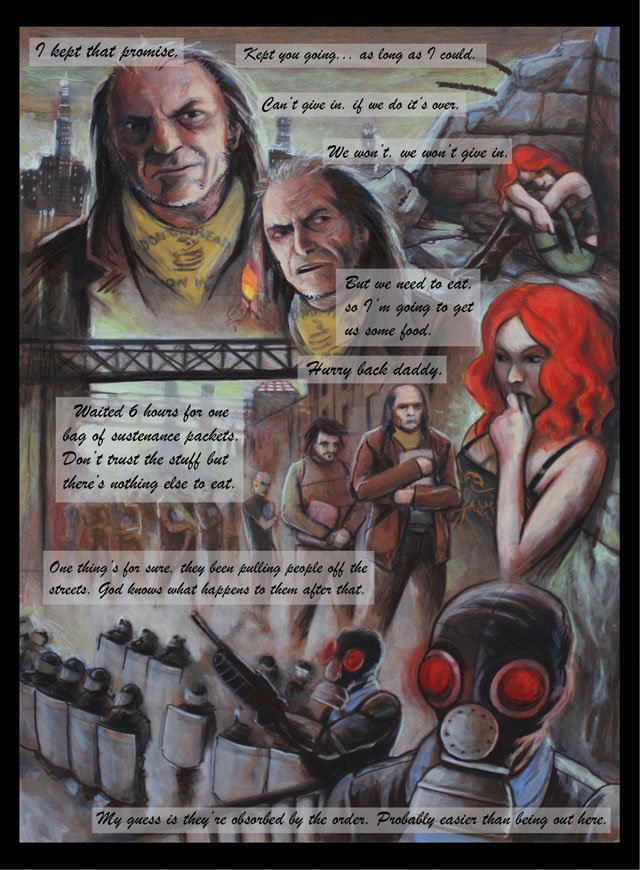



 Morton gazed across the expanse of space before him and pushed his glasses higher on the bridge of his nose with the index finger of his right hand, not necessarily because they required adjusting, but more akin to how a drug addict would have nervously twitched when presented with a fix that lies physically within his grasp, but not as easily accessible as it appeared. This temptation was not a tantalizing pile of cocaine, however, but rather a deceptively innocuous teapot.
Morton gazed across the expanse of space before him and pushed his glasses higher on the bridge of his nose with the index finger of his right hand, not necessarily because they required adjusting, but more akin to how a drug addict would have nervously twitched when presented with a fix that lies physically within his grasp, but not as easily accessible as it appeared. This temptation was not a tantalizing pile of cocaine, however, but rather a deceptively innocuous teapot.  in her formal living room that lovingly displayed an accumulation of acquired decorative china teapots. Early in his childhood, Morton had demonstrated a keen enthusiasm in his Aunt’s interest, riveted to the cabinet, gazing fixedly at each piece for long periods of time. He would ask his Aunt questions, tucking away the knowledge as it was imparted, never repeating the same query twice.
in her formal living room that lovingly displayed an accumulation of acquired decorative china teapots. Early in his childhood, Morton had demonstrated a keen enthusiasm in his Aunt’s interest, riveted to the cabinet, gazing fixedly at each piece for long periods of time. He would ask his Aunt questions, tucking away the knowledge as it was imparted, never repeating the same query twice. 
 It was in doing so one day, when he was in the midst of tracking a Lesser Spotted Woodpecker as it descended a Kentucky Coffee tree, that he had caught the teapot in his field of vision. Morton had lowered the binoculars immediately, as if not quite trusting the tool and rather needing proof of his discovery with his own naked eye. Sure enough, the out-of-place treasure was perched on the grave stone upon which he had seen it.
It was in doing so one day, when he was in the midst of tracking a Lesser Spotted Woodpecker as it descended a Kentucky Coffee tree, that he had caught the teapot in his field of vision. Morton had lowered the binoculars immediately, as if not quite trusting the tool and rather needing proof of his discovery with his own naked eye. Sure enough, the out-of-place treasure was perched on the grave stone upon which he had seen it. 







 The End
The End







